Items
Subject is exactly
Environment & Landscape
-
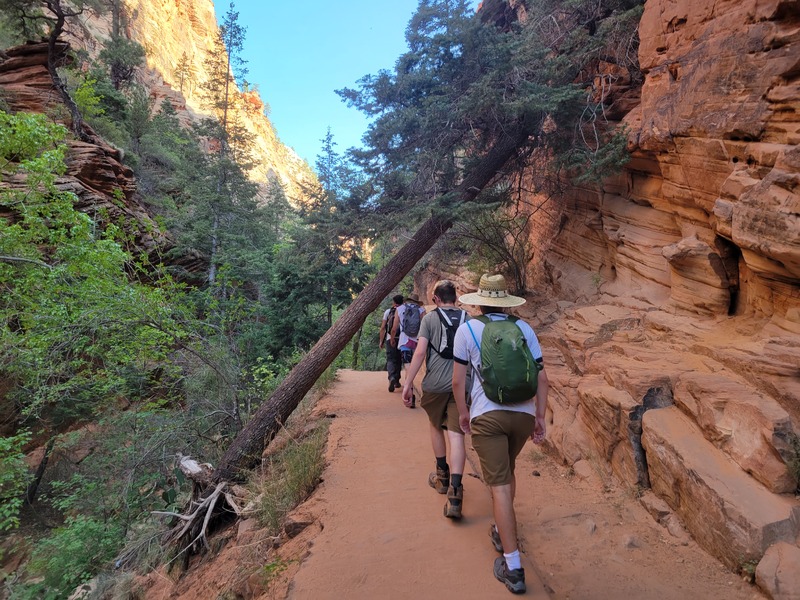 2021-07-23
2021-07-23The Trail to Angel's Landing
There are few ways to describe the events of 2020 other than chaotic. The vast, sweeping changes that occurred left many confused and grasping, often in desperation. Meanwhile, 2021 was a mixed follow-up for a year where much remained the same, but travel restrictions began to lift. Seeing this window of opportunity, four friends and I leaped at it. We planned a weeklong trip to Zion National Park and on the first day, we headed for Angel's Landing. The situation around the pandemic resulted in a kind of claustrophobia that superimposed a hyperawareness of personal space. For many, where six feet distance apart was not just a courtesy in some establishments, but a rule that was often enforced. This condition of anxiety or even fear of contracting COVID-19 from another person in the limited size of restaurants, cafes, and grocery stores was easily felt. This kind of spatial awareness bled into one's perception so deeply that it might be retroactive. While watching a pre-pandemic movie with a shot of a crowd, the thoughts would intrude, "Where are everyone's masks?" or "Why is everyone standing so close together." Southern Utah is a great expanse of mesas, mountains, and bluffs under a rolling sky. Zion reflects this in the great size of the rock formations and the verdant greenery accompanying it. The contrast in scale highlights the simple fact that getting up to the tallest point of Angel's Landing is an exercise of walking upwards at steep inclines, often with other people in front of you, creating a line. Maybe it was the change in setting, but for a while, it was as if the pandemic was left behind. Everyone still brought masks, wore masks in crowded environments, and used hand sanitizer but the anxiety was not there. It appeared to be the common rule that the other tourists had agreed to. Replacing the fear was a determination to get to the highest point of the trails and photograph the scope of it all. It was only the first day of the trip and I had already been astounded. -
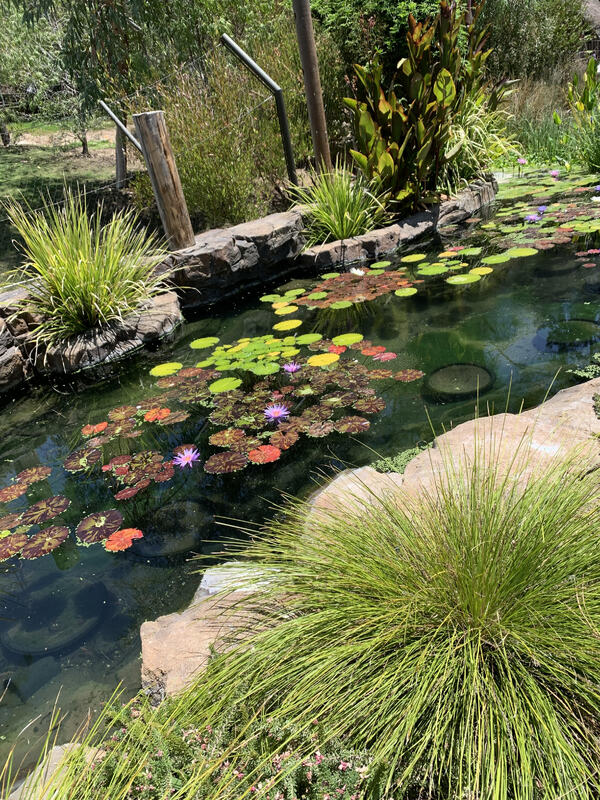 2021-07-27
2021-07-27San Diego Zoo Safari Park
Looking back at my camera roll, I chose this picture as the subject of this assignment. The picture reminded me of the first trip that I took, a year after COVID happened. The summer of 2021, my family and I were able to take a trip to San Diego, California and we decided to go to the San Diego Zoo Safari Park. I am a lover of nature and I enjoy the scenery and being able to appreciate the simple beauty of plants and animals. As any other normal traveler would do, I snapped a bunch of pictures as I was walking through the safari park zoo. I snapped this picture as I was on the tram and we were observing the large animals (rhinoceros, giraffes, etc.). This particular picture spoke to me, becuase I saw it as the first time I could actually enjoy the simplicity of having the means to travel and enjoy the beauty of the outside world, after being cooped up for so long. Since I live in the Phoenix area, it is not often that I get to see lily ponds or vibrant plants/animals in my area. I remember feeling free and appreciative of having the means to travel and see the outside world again. -
2022-06-22
The Two-Week Road Trip
When COVID-19 shut everything down in March 2020, I was in the middle of student teaching and preparing to take my last teaching certification exam. My college graduation was moved to a PowerPoint presentation, and summer plans were canceled. The first year of my teaching career was hybrid. I had a small portion of my students in person, and a majority tuned into my world geography class via Zoom. In my second year of teaching, things were slowly returning to normal. Asynchronous and synchronous schooling was no more, and students had to attend in person while wearing masks and trying to maintain social distancing as much as possible in a high school. During this school year, my family planned a two-week road trip to explore historic sites in the United States on our journey from San Antonio, Texas, to Eau Clair, Michigan. On this road trip, we traveled through and stopped in eight states. In the Summer of 2022, I embarked on a two-week road trip from June 19th to July 2nd with my mom, my younger brother, and my grandma to visit family in Illinois and Michigan. It was chaotic and wonderful at the same time. We traveled through Arkansas, Mississippi, Tennessee, Kentucky, Illinois, Indiana, Michigan, and Missouri until returning to Texas. Travel restrictions at this point were lax or nonexistent in the states we traveled to, and many people we encountered acted as if COVID-19 had never happened. Masks were hardly worn, and social distancing was gone, although signs recommending the six-foot distance still lingered around different locations we stopped at. I, however, carried hand sanitizer with me religiously and had a mask with me in case it was needed. Because of how relaxed the COVID-19 safety restrictions were in the states we traveled through, my family and I were convinced we would get sick. Luckily, we did not, but whenever we returned to the car after a sightseeing excursion, we always said, “There’s no way we didn’t get COVID that time.” We were most convinced that we had come into contact with the virus in Chattanooga, Tennessee. While in Chattanooga, we went up Lookout Mountain and into Ruby Falls. Ruby Falls is a series of caverns that lead to the tallest and deepest underground waterfall in the United States. You must descend in an elevator to get down to the cavern entrance. There were no mandatory mask signs or social-distancing warnings to board the elevator, only a weight limit. So, my mother, younger brother, and I squeezed into an elevator with about twenty maskless people and descended into the cave. On the cave tour, we were still in close quarters but were able to spread out a bit more. We traveled into the depths of the caverns until we made it to the waterfall, took our pictures, and then road back up to civilization again, compacted into an elevator. We traveled and stopped in many different places, each with various rules and restrictions regarding how that establishment was handling COVID-19. Our elevator ride at Ruby Falls was the most surprising part of our trip. This elevator ride made me feel as if people had forgotten the entire COVID-19 epidemic had occurred. My surprise was mainly influenced by the precautions I had to take as a teacher, and going out into the “wild” opened my eyes to how different parts of the country were coping with the aftermath of the epidemic. I observed many people's attitude on our road trip: "Let's just get back to normal.” -
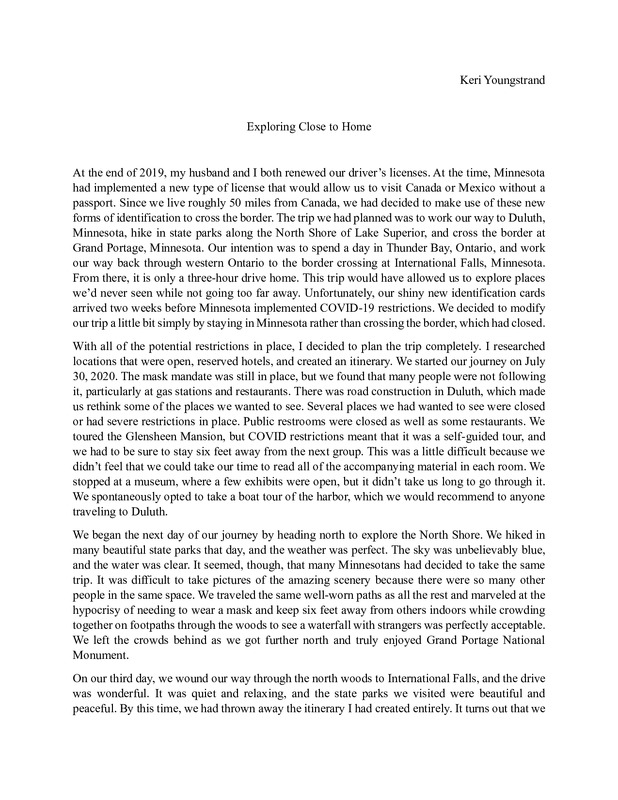 2020-07-30
2020-07-30Exploring Close to Home
This story describes the first trip that my husband and I took during the pandemic. It was at the July 30 - August 1, 2020, and we took our first trip without children in twenty years. The pandemic shaped this trip completely. First, we could not cross the border we had wanted to cross, which meant we stayed in our home state. Second, we researched destinations in ways that we never had before. Finally, the pandemic had forced many other people to seek outdoor vacations, which led to large crowds in many of the parks we visited. -
2024-12-10
Visiting Maui with Respect to Native Traditions and Local Population
Since travel restrictions were lifted on the island of Oʻahu, I still have not traveled outside the island. One place that I am keen on traveling to is the island of Maui because it is one of the main Hawaiian Islands that I have not yet explored. Prior to the devastating Lahaina wild fires in August 2023, I was deeply interested in understanding the cultural richness and historical significance of Lahaina. Now, if I get a chance to visit Maui, I would be mindful of the trauma that continues to inflict pain on the local and native populations of Maui. Therefore, I would avoid the area of West Maui and instead explore the main cities of Kahului and Kihei to better understand why Maui continues to be a tourist attraction for Americans. Near Kihei, the site of Haleakala observatory is a common tourist attraction for locals and foreigners. The ongoing debate over tourism development and the restoration of native practices is ever-present on Maui. Tourism on Maui was just recovering from the economic consequences of the pandemic and the economic hardship was again devastated by the Maui wildfires. If I were to document my trip to Maui, I would use a journal to understand the complex dynamics between the state government, tourism industry, and local and native populations. I would also use my journal to record what tourist sites continue to recover from the pandemic in spite of the wildfire catastrophe. -
2020-09-07
Pandemics & Wildfires
The year 2020 was challenging for me in a couple ways. Like so many others, the pandemic lockdown kept me home for several months. I continued school online with my local university and waited for it all to be over. As summer rolled around, my family had decided that if we were going to be isolated from others, we might as well do it somewhere we love. We spent the better part of our summer at my great grandfather’s cabin at Huntington Lake in the High Sierras. It was a fairly quiet season at the lake considering California was still under many restrictions. Shortly after our last visit, the Creek Fire started. The fire burned nearly 380,000 acres of the Sierra National Forest for about four months. Within a week of the beginning of the fire, we lost our family cabin and the historic general store, Cressman’s, that our cousins had just taken over. Our family was devastated, and it is still a very painful memory. I am, however, incredibly grateful for the last summer we got to spend there. In a strange way, the COVID-19 pandemic offered our family a small blessing in disguise. Since the lockdown required many to reduce work hours, a number of friends and family members had the opportunity to visit the cabin one last time. This photograph is a reminder of a very bittersweet summer. Although 2020 proved to be an especially challenging year, the pandemic allowed my family to make its final memories of our second home before it was gone. -
2024-03-09
A Trip to the Algarve
In October 2021, my wife and I went to Portugal for two weeks. It was our first trip since the start of the COVID-19 pandemic. We went to the southern coast of Portugal, the Algarve. Our purpose was a reconnaissance with an eye to relocation. We'd been toying with the idea of moving overseas for several years. Spain had long been at the top of our list––we spent almost three months in Andalusia a decade earlier and fell for the place––but the Spanish tax and import regulations were a bit difficult, so we looked next door to Portugal. Portugal had inviting tax and import regulations. By that October, Portugal's COVID-19 travel restrictions had eased. You just had to have up-to-date vaccines and documentation of a recently conducted, negative test. That was easy enough, so the time was right for getting on a plane. The more difficult thing was returning to the United States. For that, we had to get another COVID-19 test within hours of travel, it had to be of a certain type, and it had to be administered and certified by an approved agency. Fortunately, a company had cracked-the-code on meeting the requirements through online monitoring of a self-administered test. We bought and took with us three tests each––backups to the backups. The strangest-feeling part of the whole trip was the hours-long layover in Newark on the outbound leg. People were walking around without masks on, and we reluctantly took our masks off to eat. We had both received boosters of the Moderna vaccine, but we felt naked and vulnerable. We left our masks on throughout the flight. After landing in Lisbon, we got our rental car and drove a couple hours to Albufeira. It's a coastal town about dead-center on the southern coast. We stayed in a house, which we rented because we wanted to make our own meals. Portugal is not much of a culinary destination––the best meal we had in a restaurant was a simple margherita pizza. On top of that, we are vegetarians, and my wife has a shellfish allergy, neither of which works well in a food culture based upon seafood and pork. Also, because this was a reconnaissance with an eye to establishing residence, it was important to shop around and see the pricing and availability of goods. An unexpected opportunity to do some shopping came early in the trip. My wife and I had packed for the typical Algarve weather for this time of year: cool, windy, occasional rain. Instead, what we got was very hot and very dry. So, it was off to the mall to reconfigure our wardrobe. We found that we dislike Portuguese malls just as much as we dislike American malls. But we like beaches and long hiking trails, and the Algarve coastline has plenty of that. This is where Portugal shines: miles and miles of walkable beaches, and miles and miles of coastal trails. Our days were spent driving to, and then walking trails and beaches at, coastal destinations along the entirety of the Algarve coastline. We also like friendly people, and the Portuguese are definitely that. My wife and I have travelled extensively, typically staying in each destination a month or more, and the Portuguese are at the top of the friendliness scale. Two days before our departure, we took the US-mandated COVID-19 tests. We logged into an online teleconference system and self-administered our tests at the direction of a talking-head on the screen of our laptop computer. We both received negative test results, which we forwarded to the airline. Then we drove to Lisbon, where we spent our last two nights in a downtown hotel. We walked around the city for hours, quickly discovering that we had arrived on one of Portugal's many holidays. But we were impressed by Lisbon as a city that felt safe and walkable, much unlike typical American cities of similar size. Our return flight was easy on the Portuguese end. On the American end, we met the lines and discourtesy typical of the US customs process. Then we caught a connecting flight to Richmond, Virginia, and from there drove a couple late-night hours to our house in Tidewater Virginia. A year after this trip, we moved to Portugal. As I type this, we have been residents for seventeen months. We currently live in the Algarve, a twenty-minute drive from the house we rented in 2021. The long beaches and friendly people more than made up for the bland food and the trip to the mall. -
2021-07-01
Falling In Love With Chicago
As the world slowly emerged from the grip of the COVID-19 pandemic, life began to regain a semblance of normalcy. With restrictions lifting and vaccinations becoming widely available, my family eagerly embraced the opportunity to reunite with loved ones and explore the world beyond the confines of our home. After our children became eligible for the COVID-19 vaccine, my husband and I decided to embark on a memorable journey to visit family in Chicago. The decision was influenced by the fact that Illinois had taken the pandemic seriously, and the situation seemed relatively stable. The excitement in the air was palpable as we packed our bags and set off on the adventure. The journey itself became a testament to newfound hope and optimism, a stark contrast to the anxiety-ridden days of lockdown. The rhythmic hum of the Amtrak train and the gentle swaying of the carriages created a soothing backdrop to our anticipation. After almost three days on the train, we finally reached our destination. As we settled into the rhythm of Chicago life, we found ourselves enchanted by the city's rich history and vibrant culture. The streets echoed with the footsteps of generations past, and the architecture told stories of resilience and progress. Our children's eyes widened with each new discovery, absorbing the lessons of the past and the beauty of the present. The museums became classrooms, and the parks transformed into playgrounds of learning and exploration. From the towering skyscrapers to the serene shores of Lake Michigan, Chicago opened its arms wide, inviting our family to immerse ourselves in its tapestry of experiences. Over the course of two weeks, we marveled at the diversity of the city, the pulsating energy of its neighborhoods, and the friendliness of its people. The world-class museums, the iconic Millennium Park, and the deep-dish pizzas became integral parts of our family's collective memory. The reluctance to leave grew with each passing day, as Chicago had become more than a destination; it had become a second home. The connections made, the lessons learned, and the memories forged painted a picture of a city that had welcomed our family with open arms. As we boarded the Amtrak train to return home, a mixture of gratitude and nostalgia-filled our hearts. Chicago had been a beacon of joy and discovery during a time when the world needed it most. The journey had not just been about a visit; it had been a transformative experience, a reminder that even in the face of adversity, there was always the possibility of finding beauty, connection, and a sense of belonging. The trip to Chicago amid the COVID-19 pandemic symbolizes a shift from a period of uncertainty and isolation to one of hope, reconnection, and exploration. That being said, the nervousness still set the undertone to the trip. The eligibility and administration of COVID-19 vaccinations mark a significant turning point in our family's ability to travel. It really shows the importance of vaccines as a tool for regaining a sense of freedom and the ability to engage in activities that were restricted during the height of the pandemic. The exploration of Chicago's history, culture, and landmarks communicates our desire for new experiences and rediscovery of the beauty in the world. The trip became almost like a metaphor for the broader human experience of seeking joy, adventure, and learning, even after enduring a period of hardship. As we chose to travel to a location where the pandemic was taken seriously, it is clear the new considerations the pandemic has led families to consider. This almost suggests that communities and regions that take the pandemic seriously create an environment that fosters a sense of safety and encourages responsible travel. We were so grateful to get to travel to Chicago, and it is undeniably one that we will remember forever. -
2022-06-30
The Road Trip 2022
Road Trip During the heat of covid, the spring of 2020 through the fall of 2022 I worked for our local school district in Arizona. My family and I did not do a lot of traveling beyond the necessary during the mandated restrictions. After the bulk of the restrictions were lifted and vaccines were widely available I participated in a work trip to San Diego to attend a convention. My partner and I decided to springboard off this and turned the summer into a west coast road trip to visit with friends and family. We started in San Diego and the highlights of this trip were Portland, Oregan, Seattle, Washington, and San Jose, California. On our jaunt along the coast there were still precautions being taken. Many people still wore masks out and were positioned with more space in public. Of the people we visited and stayed with on our journey, some were still social distancing, and taking precautions when going out. Our adventure was a good way to reconnect with the people we hadn’t been able to see during the lockdown. My partner and I were able to visit some important places from my childhood and have some epic picnics. There is a lake and small national park near my Grandparents’ home that is open to the public. The tree cover and water line is cut with an easy hiking path. We got to traverse about a mile of it. Taking in the beauty that could easily have been featured in a fairy tail description of an ancient forest. It was a great way to break the isolation and share some of the past with my partner. -
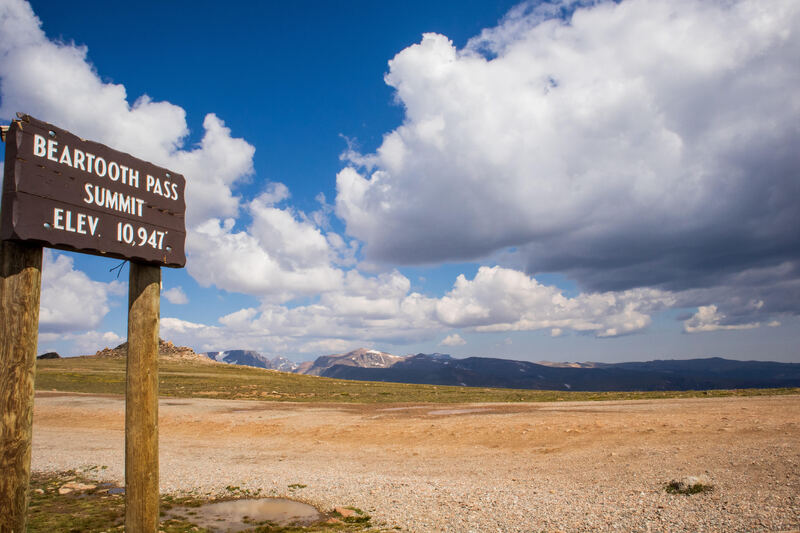 2020-07-28
2020-07-28Beartooth Pass
In late July 2020, my wife (then girlfriend), my family, and I took a trip to Sturgis, South Dakota for the annual Black Hills motorcycle rally. During the trip, we traveled to Red Lodge, Montana, where we spent two days riding our motorcycles into Yellowstone National Park. Of all the memories we made on that trip, driving on Beartooth Pass, one of the most dangerous roads in the United States, was my favorite. The views were stunning and the ride was exciting, with near-vertical dropoffs and few guardrails. In South Dakota, the only COVID-19 restriction in effect was mask mandates inside restaurants and stores; in Montana, there were no restrictions. -
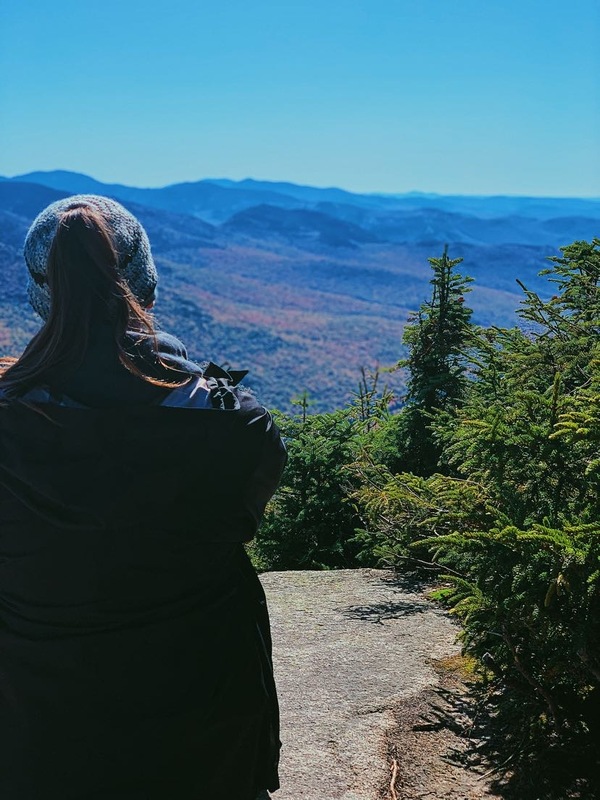 2020-05-08
2020-05-08Scaling Mountains - Overcoming Obstacles (and New Englands peaks) During the Covid-19 Pandemic
During the pandemic, I was lucky that I didn't lose anyone close to me. I know many people around me and in the world who watched their loved ones die from COVID-19. It has also had long-lasting health effects on many people as well. It is an ongoing conversation because people are still contracting the virus daily. Lockdown was a surreal moment for many in our ordinarily fast-paced world. The entire world stopped, and for once, we couldn't rely on our usual entertainment and schedules for distraction. This led to the development of new habits, which, unfortunately for me, were not just board games and binge-watching Netflix. Alcoholism had been at my doorstep since my senior year of high school, with my dependence on the substance worsening as the years passed. This is a genetic condition, and I have had countless family members struggle and die because of substance abuse, mainly alcohol. When the pandemic hit, I drank nearly every day, and this continued during lockdown with my roommate and a few friends. Not only was this dangerous because of the spreading pandemic, but it also worsened my mental health. Soon, my college shut down, and I had to move back home, where my substance abuse continued. My relationship had fallen apart when my ex moved back to India as he was on a student visa. The drinking and emotional isolation/strife led to a breakdown wherein intrusive suicidal thoughts plagued me. Something had to change; one night, I quit all substances and contacted my PCP about a mental health evaluation. I know my diagnosis was wrong, but it got me on the medication I needed to forget the intrusive thoughts and piece my life back together. My saving grace was my father and, eventually, my friends, who decided to pick me up and give me a distraction. This distraction became hiking mountains, a shared hobby of previous substance abusers. The chemicals released in the brain during these hikes and the physical exercise filled the void alcohol used to. It served it and began to heal the void left by years of mental health struggles and abuse. Like in this picture, the world's problems and my own seemed small when I was on top of a mountain. Not only that but also hiking is a very social-distance-friendly activity. The love for hiking fostered in my childhood was rekindled during the pandemic and remains one of my favorite things to do. My father and I are attempting to walk up all New England's notable peaks. -
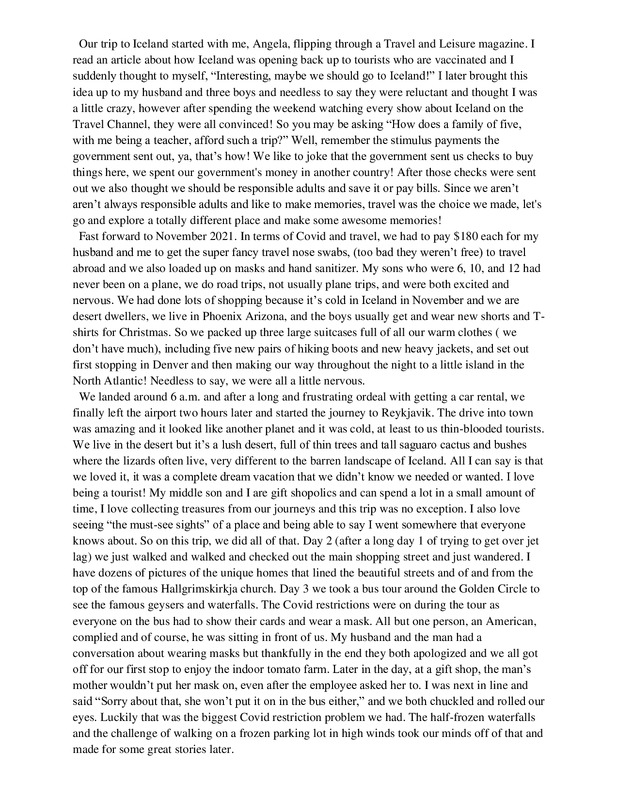 2021-11-19
2021-11-19Our Adventures In Iceland
I've written a story sharing our Covid trip to Iceland that we were able to take after the restrictions were lifted. I don't think we would have gone if the circumstances were different, it was a life-altering trip for us, something joyful in the midst of a world crisis. -
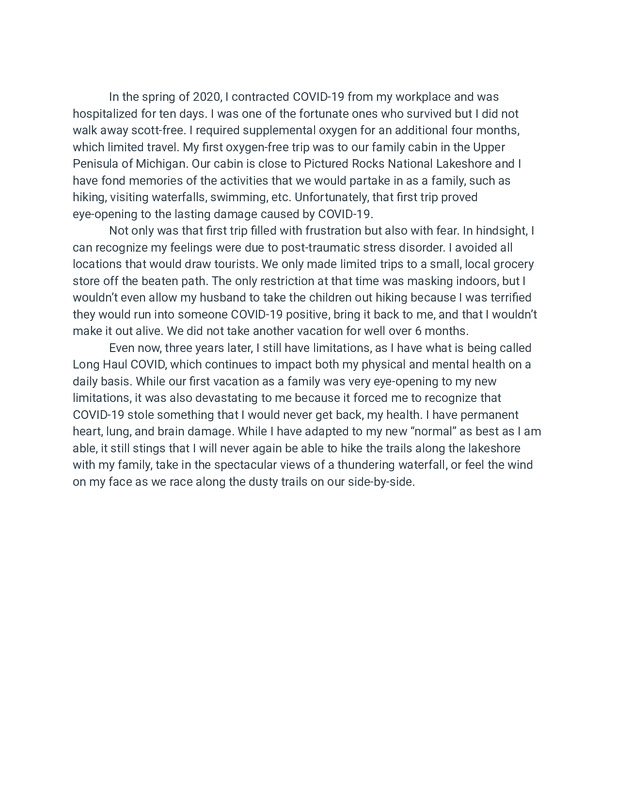 2020-08
2020-08Memories are Like Waterfalls; a Post-COVID-19 Recovery Vacation
As a survivor of COVID-19 with long-lasting damage, this memory still brings feelings of anger and fear to the surface. It takes place at a family cabin that was the epicenter of many happy memories all the way from childhood through becoming a parent myself. That first trip back forced me to see all that COVID-19 had stolen from me and would continue to steal from me for the rest of my life. -
2020-09
Yosemite COVID Camping
Living in San Diego at the time, once travel restrictions were lifted, I went to Yosemite National Park as I thought being in an outdoor open-air environment would mean less COVID-19 restrictions. As an avid backpacker and nature enthusiast, I could not wait for the national parks to reopen so once Yosemite opened its proverbial doors I jumped on the opportunity, as I had never been there before. My memories of the trip are very fond ones. I remember the emptiness throughout the park. One of the COVID restrictions implemented by the park was the limitation of people who could enter on a daily basis. Due to this finite number of visitors, and me being one of them, this made the park feel fairly empty, which was amazing. Not having congested trails and camps made my trip seem like I was in some remote forest, vice one of the most famous national parks. So, besides the stunning views and crisp air, one of my primary memories is the feeling of seclusion throughout my time due to COVID-19 entrance restrictions. Also, I remember a lack of masks and overall COVID-19 consciousness throughout the park. Even though the park had a mandatory mask policy, I remember not seeing many masked people. I honestly thought the mask restriction was overkill due to the already implemented restrictions and being outside, but I did notice we all would use masks if coming near other people on trails. Yosemite still had several COVID-19 restrictions implemented throughout the part. Aside from the aforementioned entrance cap and masks, all their restaurants, hotels and general facilities remained closed. Also, they spaced out the campsites, so each camp had at least one camp space between them, limiting the sharing of space. They even closed specific trails due to the lack of workers at any given time. The park employees were few and far in-between due to a COVID-19 restriction, which meant less accessible trails since they would not supervise them all with such limited manpower. Besides that, the COVID-19 restrictions were not abundant, which was likely a product of the open-air environment. -
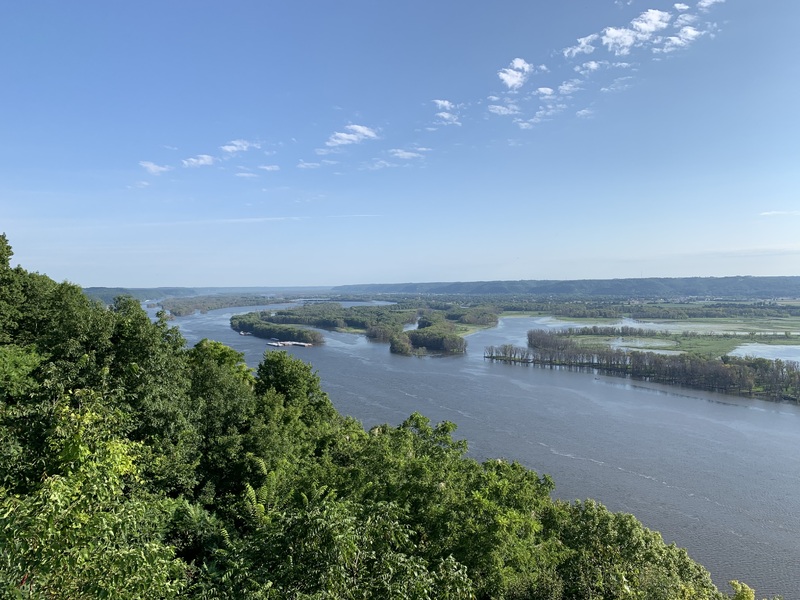 2020-08
2020-08Tourism During the COVID-19 Pandemic: 2020 Mississippi River Social Distancing Trip
This photo was taken along the Mississippi River in August 2020, shortly after stay-at-home orders were lifted in the Midwestern U.S. but still when other states (ex: New York) had tighter restrictions and 14-day quarantine policies upon arrival. My family chose to take this drive because most attractions were outdoors. We traveled here because it was extremely easy to escape crowds and still provided excellent scenery -- and I always enjoy going to more remote areas for that reason. One thing I remember is not visiting any restaurants due to fear of contracting COVID; we ordered all of our dinners to go and had a picnic lunch every day. Since this photo was taken, I have traveled to many other destinations, as I received my vaccines in early 2021, and felt more comfortable interacting with the public. -
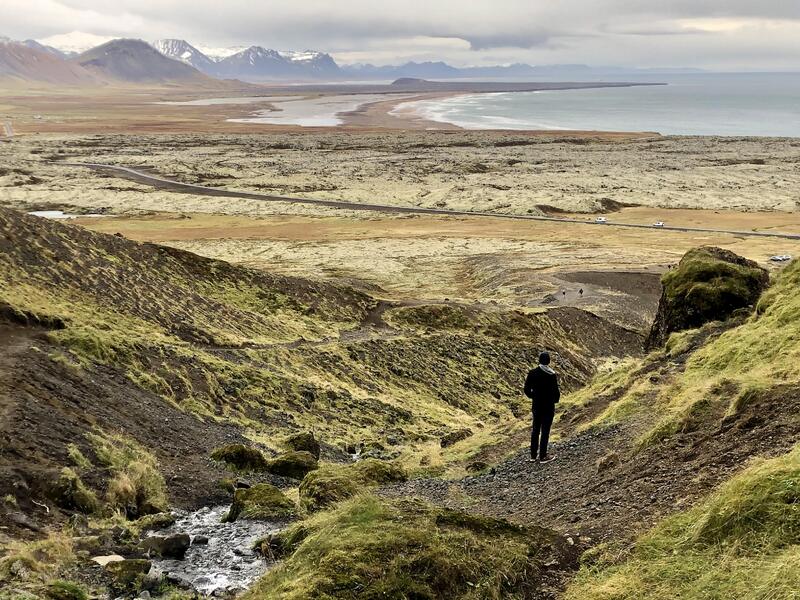 2021-10
2021-10Woodcrofts in Post-Pandemic Iceland
First, let me say that I am not a big traveler. I was never bitten by the travel bug, and I had no strong desires to see the world. A bit controversial, but I remember feeling even just a few months of lockdown during the COVID-19 pandemic that I needed to get out. I needed to escape my house, not because being quarantined and working from home with my husband was problematic or bad as far as our being with one another 24/7, but I just felt very confined and small, almost suffocated. There’s a difference, I think between choosing not to travel or leave your house and not being able to leave your house because of guidelines and the risk of spread illness. My husband and I had planned a trip to go to Iceland in September of 2019, but I just started a new job and couldn’t get time off that soon after starting, so we pushed it off to – as luck would have it – March 2020. In fact, it was planned for about a week or so after the entire world shut down and said “stay home.” At that point, we were “refunded” our tickets and accommodations, and were in this place of not know when or if this trip would happen. By refunded, I mean that the airline gave us a credit for the amount needing to be spent within a year after this date. So we felt in a bit of a dilemma and unsure of what to do. The news of the pandemic and the guidelines were – understandably - constantly shifting, and we were looking at international travel, so we had to frequently check the U.S. travel restrictions as well as Iceland’s restrictions and compare. Even then, restrictions fluctuated, at some points saying travel was allowed on one end, at others, if you test positive you may have to stay there for your entire quarantine period in a designated space away from others, extending your stay for potentially a month. It was a force to even consider planning. Finally, the stars aligned, and we were able to schedule our trip for October 2021, two years later that we had originally planned, but we were going and excited, if a bit nervous. I remember from the day we picked the flights looking up the travel restriction websites every day. I bookmarked the U.S. and Iceland’s sites to check to see if anything had changed in terms of guidelines or cancellations. We knew that we needed to schedule a covid test about 1 week prior to the flight and upload and bring proof of a negative result for the airline. We had been vaccinated, so we had to bring our cards for verification at customs. We also at that point, scheduled our return flight’s covid testing in Iceland to make sure that we had another negative result so we could come home. It was incredibly stressful trying to schedule all this, some sites were booked up, we had to take time off of work to get available appointments before going, all while reminding ourselves this is supposed to be a fun trip, a vacation in a country neither of us had visited before. Luckily, everything by way of travel went well. At that point, being in such a crowded area, like an airport, felt strange and uncomfortable. Everyone wearing masks, but still getting closer to us that we were used to now. We had heard stories of how planes are breeding grounds for covid, the air was recycled, so if someone on the plane is a false negative, they’ll give it to everyone. But we landed 6 hours later, and were relieved to do so. Despite not seeing a single puffin, our week in Iceland was absolutely fantastic; however, I can’t say that it wasn’t hindered a bit by covid and the transitioning public guidelines. After planning this trip for two years, we had read and marked up a number of travel guides that suggested areas to visits, restaurants to try, and trips to take while there. None of these books were equipped to prepare us for what vacation would look like post-pandemic. On one side, the sites and streets, even in the city of Reykjavik, were not nearly as crowded as we had read and expected it would be, which, for someone like me, who gets incredibly overwhelmed when around too many people, was perfect. We were able to visit museums, go on a virtual flyover of Iceland’s landscape, and see sights with no line or trouble. On the other hand, many store, restaurant, and attraction hours had changed or were complete shutdown, and were not updated on Google or on company sites. Occasionally we would finally reach a destination and find it was closed, but we understood that this was a small price to pay overall for a trip to Iceland so soon after things re-opened. One restaurant we stopped at in a small town south of Reykjavik was completely empty, we were the only customers from when we walked in to when we left. We were able to talk to the owner, who was saying that this is what it has been like for them since the start of the pandemic and restrictions on travel, especially international travel and tourism. It was a family-owned restaurant, where the owner and his wife sold art and homemade Nordic pieces on one of the tables in the back. They relied on tourism and the income of international visitors, and they said that this was the hardest part of the pandemic for them, seeing Iceland, a huge tourist spot for years, now hit financially and, really their way of life, changing because of this long ban on travel. For our trip across the country, fortunately, as it is, my husband and I are moderately outdoorsy people, so most of what we wanted to see or wanted to visit was outside and didn’t have the same restrictions that we found in town. We were able to spend a day at the Blue Lagoon, climbing a relatively recently active volcano, walk on the black sand beaches, and just drive around, climb out of the car and hike up a hill for the view. Early on, we decided to abandon our strict itinerary and just think of what we might want to do the next day and plan from there. It was jarring for someone like me, who is almost too reliant on structure and order, but the flexibility worked better and developing that mindset of being adaptable in this post-pandemic time helped combat the frustration and panic we felt after realizing so much had changed from the typical and expected. A stark difference we noticed while there was the general feeling towards covid-19 guidelines and vaccinations there compared to the U.S. at the time. Since the start of the pandemic, so many people were outspokenly skeptical and against the restrictions and guidelines in place and the vaccine, but we never really experienced any of that in Iceland. Rules and guidelines were quietly followed wherever we went, wearing a mask or maintaining distance, there was never a fight or resistance to this. We never saw or heard of any anti-vaccination groups or protests, as we had experienced both where we lived and on the news across America. All in all, our trip coming out of the pandemic was great, if not a bit unexpected because of the guidelines and transition period that came from international travel post-covid. -
2023-07-13
My trip to Xinjiang
For myself and many others in China, people were faced with policies and travel restrictions that were put in place due to the Covid19 pandemic. These policies and restrictions included, but were not limited to: quarantines, frequent nucleic acid tests, scanning a code in order to enter all sorts of places, and working from home. These covid policies and travel restrictions were finally, and fully, lifted this past winter, in January of 2023. This summer would be the first chance my family and I have to travel, and we will actually be starting our trip tomorrow, on July 13, 2023. As this is the first summer after covid policies were lifted, I’m expecting many places to be crowded. My wife has already done some research and has come across some videos on social media that shows some scenic spots that are crowded. As for the trip, we will be going on a road trip to Xinjiang, which is China's westernmost territory. We chose this place because we have never been there and have always wanted to visit. It is supposed to be one of the more beautiful places in China. While we will visit some urban locations, they will not be our primary focus as we are more interested in natural scenery. We’ll be starting out trip tomorrow, on July 13, 2023 and will be driving to areas in regions around Urumqi, Xinjiang. Among the places we will visit are Turpan, Sayram Lake, and Tekesi Bagua City. After that, we will drive back to Beijing, stopping at various places along the way and spend a few days in each place. Along the way, we plan to take many pictures and buy some souvenirs. My children might also have to write about the trip as well for an assignment for school. -
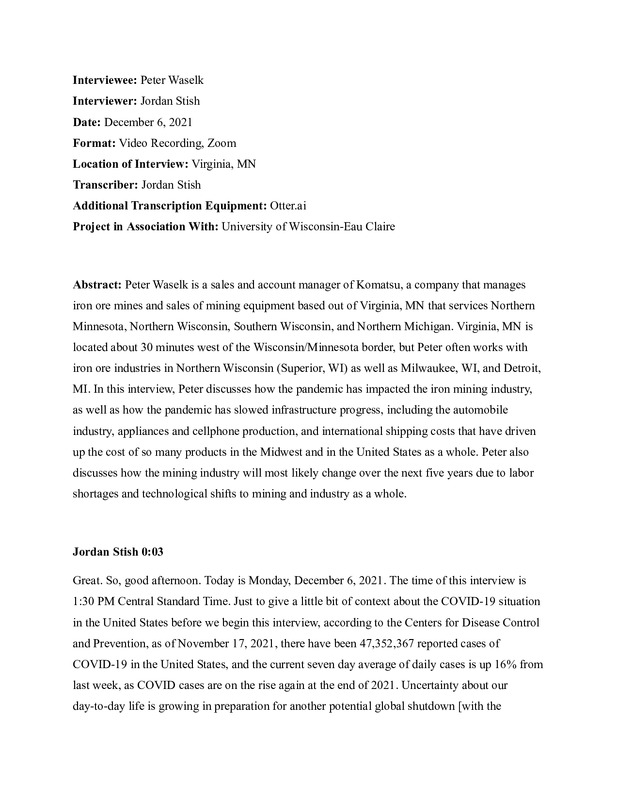 12/06/2021
12/06/2021Peter Waselk Oral History, 2021/12/06
Peter Waselk is a sales and account manager of Komatsu, a company that manages iron ore mines and sales of mining equipment based out of Virginia, MN that services Northern Minnesota, Northern Wisconsin, Southern Wisconsin, and Northern Michigan. Virginia, MN is located about 30 minutes west of the Wisconsin/Minnesota border. Still, Peter often works with iron ore industries in Northern Wisconsin (Superior, WI) as well as Milwaukee, WI, and Detroit, MI. In this interview, Peter discusses how the pandemic has impacted the iron mining industry, as well as how the pandemic has slowed infrastructure progress, including the automobile industry, appliances and cellphone production, and international shipping costs that have driven up the cost of so many products in the Midwest and the United States as a whole. Peter also discusses how the mining industry will most likely change over the next five years due to labor shortages and technological shifts to mining and industry as a whole. -
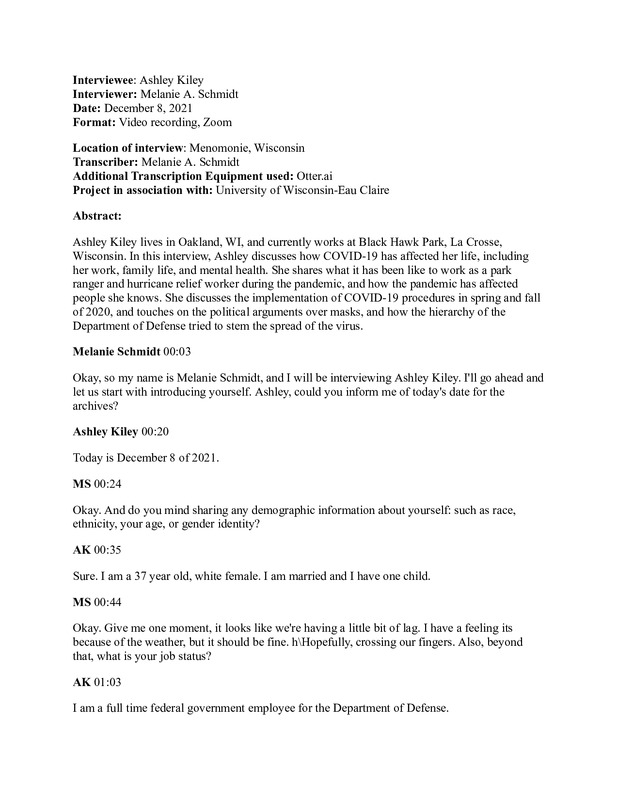 12/08/2021
12/08/2021Ashley Kiley Oral History, 2021/12/08
Ashley Kiley lives in Oakland, WI, and currently works at Black Hawk Park, La Crosse, Wisconsin. In this interview, Ashley discusses how COVID-19 has affected her life, including her work, family life, and mental health. She shares what it has been like to work as a park ranger and hurricane relief worker during the pandemic, and how the pandemic has affected people she knows. She discusses the implementation of COVID-19 procedures in spring and fall of 2020, and touches on the political arguments over masks, and how the hierarchy of the Department of Defense tried to stem the spread of the virus. -
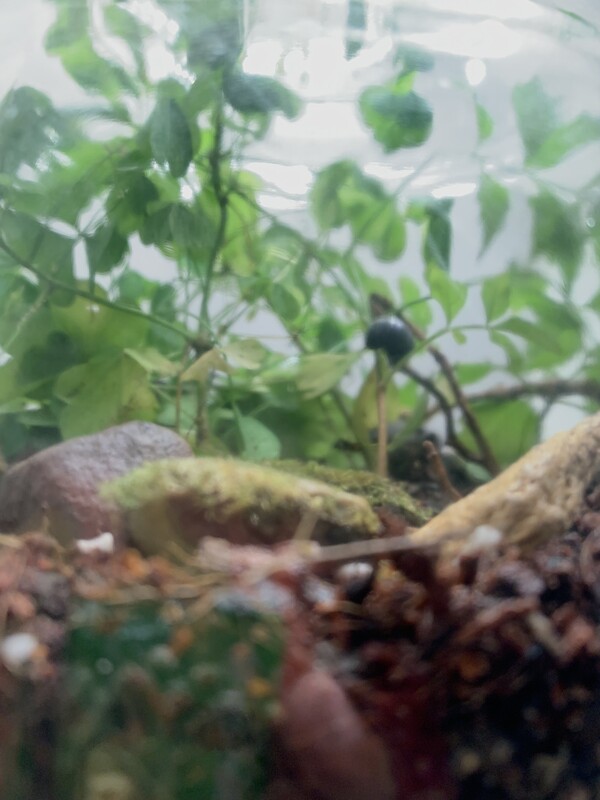 2021-09-06
2021-09-06Terrariums out of Boredom
Covid took us away from everything and reality was hard to cope with. I decided to retreat into nature. The struggle was that I hated being in my house and I couldn't stay outside forever. I decided that I would bring nature indoors and started to make terrariums. I was able to exercise, practice a hobby, create art. and safely quarantine all at once. -
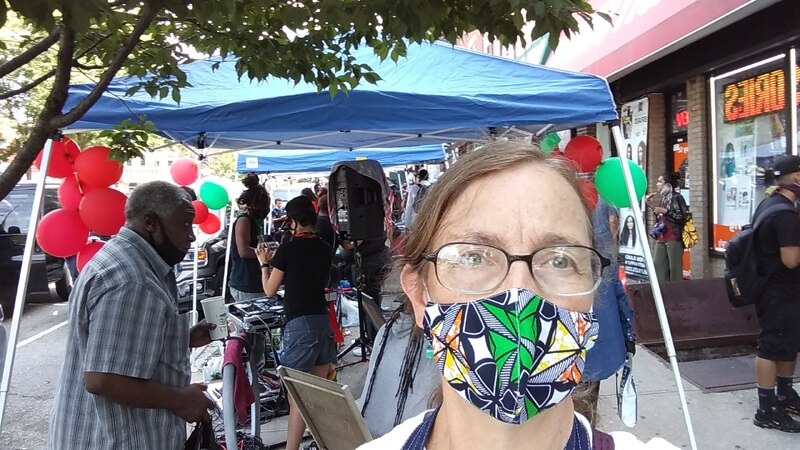 2020-06-22
2020-06-22Outside on the streets of Staten Island and Brooklyn
These photos depict some of the events and activities I was part of during the summer of 2020. I marched to protest the killings of innocent black men by police, I attended a street festival held in honor of Eric Garner (on the anniversary of his death), I worked at a Brooklyn Greenmarket doing "covid support" (a very stressful job), and I visited the peaceful grounds of Snug Harbor, wearing my favorite polka-dot mask made by a friend. -
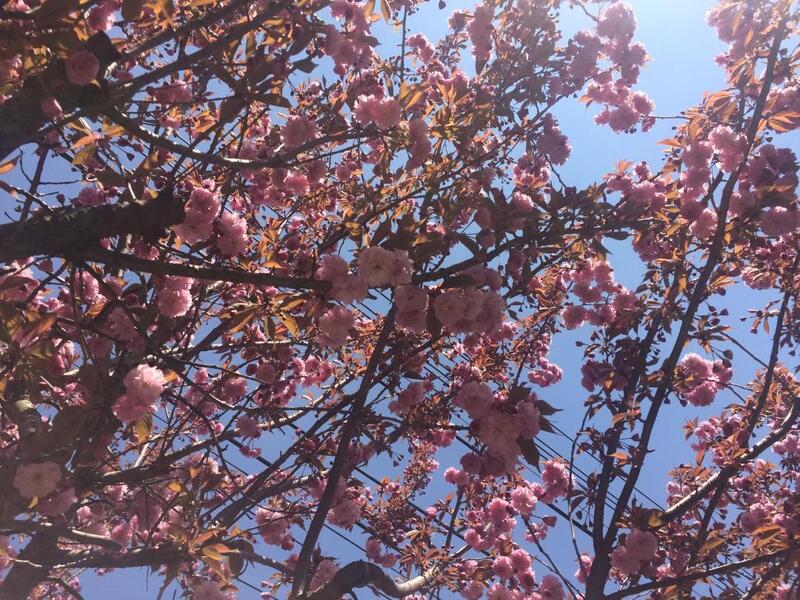 2023-03-25
2023-03-25Lockdown Story from A Different Perpective
“During the lockdown, it seems that everyone took on a small hobby to keep themselves busy. For me, I took on a couple to keep me busy. One of them included going for daily walks and taking photos of the scenery around me. I’ve taken walks even before COVID, but this was the only time where I really took my time and payed attention to my surroundings. I normally don’t bring my phone as that time is my 20 to 30 minutes away from technically, however I started to bring it along with me to take photographs of the trees blooming in spring and everything starting to grow and looking amazing. For the remainder of 2020, I kept to my hobby of taking photos and made sure to capture scenery I thought looked interesting. I especially made sure to snap photos in the same spots to capture what they look like in each one of the seasons. Luckily with it snowing weeks before Christmas that year, I was able to get a photo of one street during each one of the seasons. To me, they looked really cool!” Photo by Kyle Collesano, April 19th, 2020 #lockdownstatenisland -
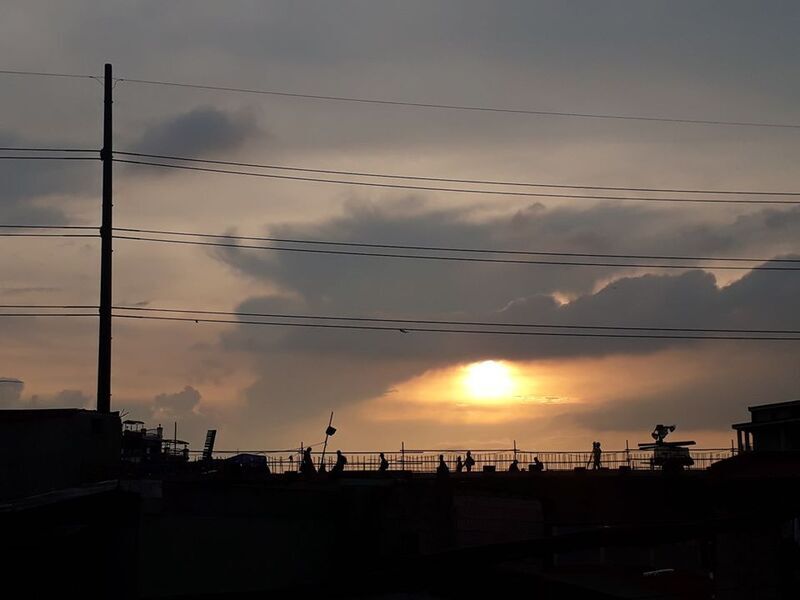 2023-03-13
2023-03-13The Meaning of Sunset in Lockdown
This photo is from A Journal of the Plague Year in the Philippines, submitted by Mark Anthony Angeles on May 19th, 2020. I picked this photo because it connects to my experience from lockdown. The sunset to me represents an end of a chapter or era, as in, the end of my first half as an undergrad student. While it was stressful by end of sophomore year, I pulled through without any issues. But the light of the sunset to me also means that there is hope and that things will get better. That’s what I hope throughout lockdown, hope😌. #lockdownstatenisland -
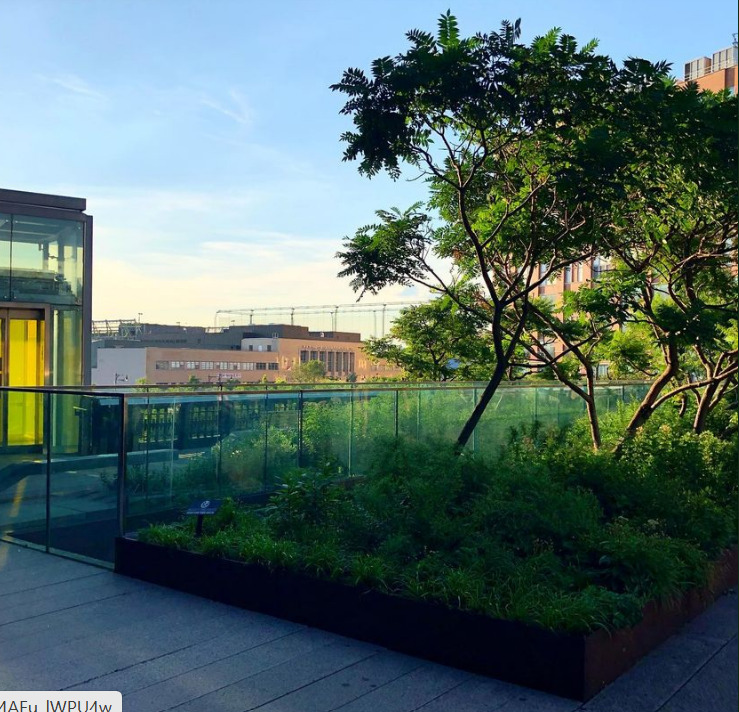 2020-07-21
2020-07-21#twilight on the #highline #nyc #elevator #greenflash
#twilight on the #highline #nyc #elevator #greenflash https://instagr.am/p/CC7EA8ApfcE/ -
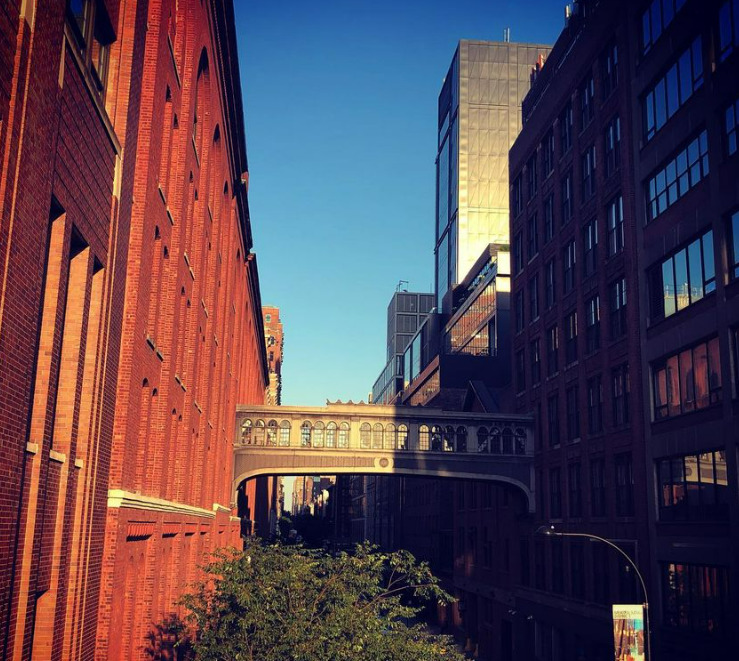 July 21, 2020
July 21, 2020#highline #nyc #goldenhour #bridgeofsighs #bluesky
#highline #nyc #goldenhour #bridgeofsighs #bluesky https://instagr.am/p/CC7EWhrpc-j/ -
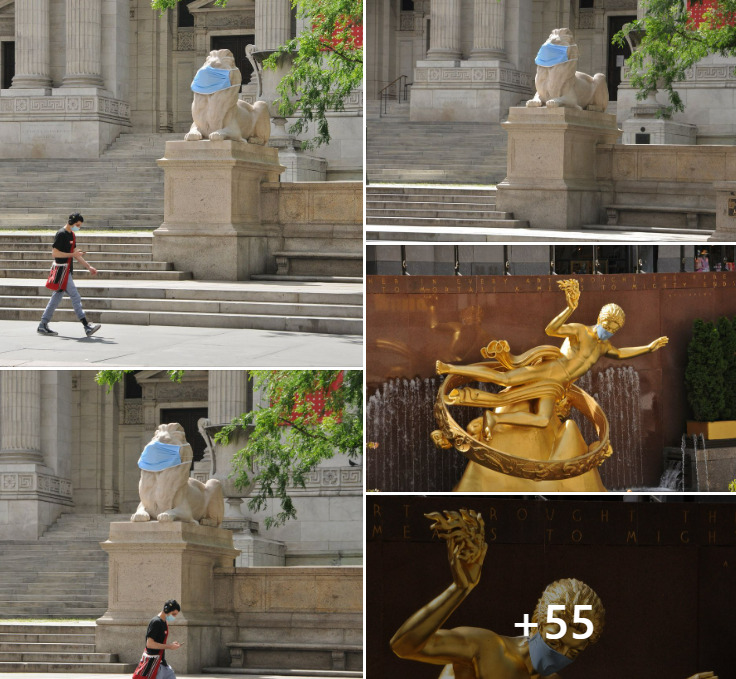 July 27, 2020
July 27, 2020A Covid Summer in NYC
A Covid Summer in NYC -
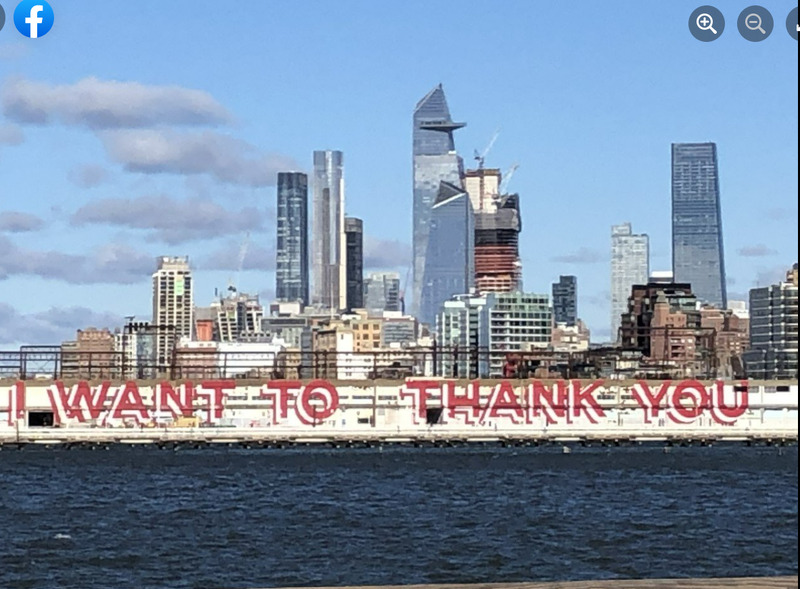 December, 2020
December, 2020Battery to Chelsea, along Hudson River Park.
I took this photo a couple of weeks ago walking from the Battery to Chelsea, along Hudson River Park. -
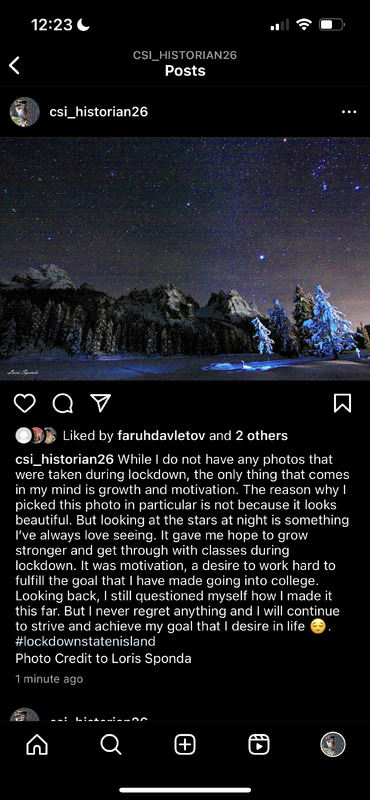 2020-03-11
2020-03-11What Happen During Lockdown
The lockdown gave me motivation like looking at the stars -
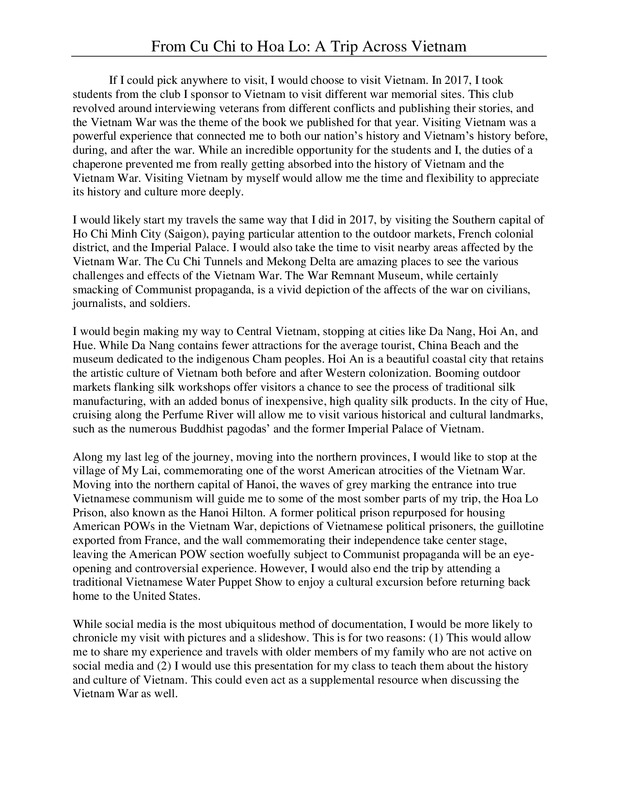 2018-03-11
2018-03-11From Cu Chi to Hoa Lo
Travel to Vietnam is seeing increased tourism in the post-COVID world, so while restrictions have dropped, certain destinations that have been included, such as the Cu Chi tunnels or the War Remnants Museum, which typically are densely packed, may have included changes to improve public safety and health. -
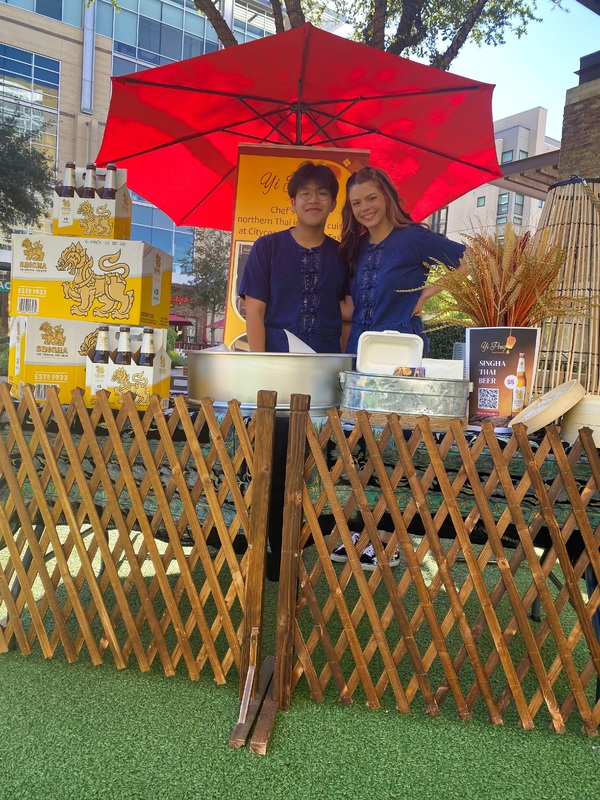 2022-10-01
2022-10-01Chan Yak Ja Pbai (I Want To Leave)
Unfortunately, I have not been able to travel since the COVID-19 restrictions were lifted. The last two years of my undergraduate were affected by the pandemic, and initially, I was planning to study abroad during my senior year. Unfortunately, that was not possible and I was barely able to complete my student teaching placement for my Secondary Education Minor as the program was constantly under revision to ensure student safety. Now, as a graduate student, if I could go anywhere it would easily be Thailand as that is where my personal historical focus is. While my Thai is far from fluent, I have been steadily learning the language for about a year now as I hope to have an opportunity to complete an extended stay for scholarly or leisurely purposes. In terms of specifics, I would first like to travel to Chiang Rai, Sukhothai, or across Isan as Northern and Eastern Thailand have some of the richest historical and cultural sites, combined with the fact that individuals who I am very close to are from these areas as well. I have worked part-time at a Thai restaurant in Houston for a significant amount of time which helps considerably with practicing the language. As I am one of the only foreigners that works for the restaurant, the owners, my co-workers, and the individuals I have been introduced to through them have become like a second family to me, and I am very grateful for their generosity, inclusivity, and willingness to teach me as an outsider to the culture. Thus, I would love to be able to visit the areas that have meaning to them as well as fulfill my own historical ambitions. Two of my closest co-workers and I discussed traveling to Thailand and Laos together, and we agreed it would be interesting if we started a vlog to document the process. Not every temple or historical landmark allows photography or video to be taken, but I do think a vlog would be a great way to capture the moment as I am not the best at actively documenting things through social media. Video documentation also has the advantage of directly capturing the emotions and excitement of traveling as opposed to journaling or even photography. The photo I chose is of my co-worker and me at an event for the restaurant promoting Northern Thai cuisine in the traditional "Mo Hom", or the shirts worn by rice farmers. -
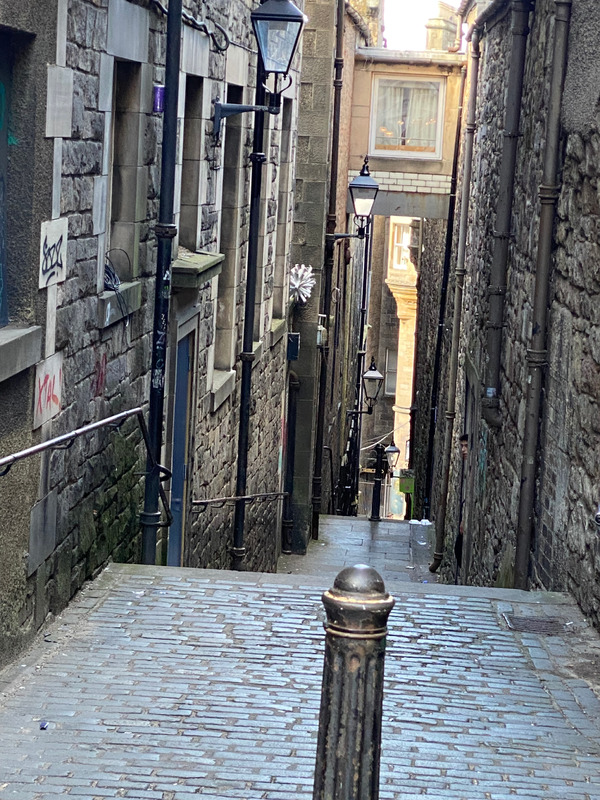 2021-04-18
2021-04-18Edinburgh and Northumberland, "Post Pandemic" Historical Tourism
I had been dreaming of this trip since 1996 when I went to England on a high school theatre and literature trip and fell in love with the UK. Specifically, I fell in love with Scotland and its history, becoming a British History enthusiast. In August, 2021, I completed my BA in History at ASU, then changed careers from Film/tv costuming to a special education teaching position. During the peak age of Covid-19, I worked full time, completed full time undergraduate studies, interned in politics and not-for-profit law, and started over in a new career and life in a new state. All of 2020-2021 was a non-stop adrenaline rush of constantly moving, getting Covid, and burning out mentally along the way. In 2021, I was halfway through a teaching contract and gravely unhappy, longing to just... escape. I kept dreaming of one photo of Edinburgh that was on my vision board. The picture, from Pinterest, was of a narrow Close in Old Town, Edinburgh, the historic "original" city that squeezed so much history and magic in about a mile. Old Edinburgh held tens of thousands of people in one square mile with their Closes serving as narrow alleyways between buildings of both stone and wood, both affluent and poor societal classes. After creating this vision board, I started working a ridiculous amount of overtime in the school's residences for special needs students and saving money. I was used to already working over 60 hours a week, so I didn't see the problem yet. The short staffing crisis of special education staff provided the opportunity to earn $40/ hour plus $1000 monthly bonus for anyone willing to work and be okay with less support for challenging behavior or emergency resources. I was willing to work hard to be free for just a short time over the Easter/Passover School break. Flight and accommodation prices were incredibly low at the start of 2021, encouraging tourists to travel. British Airways and other airlines offered incredible fares! These discounts still enabled me to book more affordable fare into 2023. My flight from Boston to Edinburgh was just over $400, with 7 nights stay in two 4 and 5 star hotels plus one castle for a total of less than $1000. My dream trip was planned to every detail and paid in advance or booked for free with historical memberships. The pandemic and rising popularity of Airbnb and Verbo created the perfect discounts for hotels and upgrades to better suites. Pre-pandemic, I got bed bugs from an Airbnb and had a nightmare of an experience, so it was out of the question for accomodation moving forward. While in planning stages, I booked historical tours and entry into sites like Edinburgh Castle, Mary Kings Close, Ghost Tours of the Vaults, Sterling Castle, then in England, Alnwick Castle and Chillingham Castle's paranormal investigation. I already had memberships to multiple British historical and public sites like the Alnwick Gardens (site of the famous Poison Garden) and Historical Scotland. From Edinburgh Castle to Chillingham Castle, I finally got to see the gallows, dungeons, and artifacts that were in my undergraduate classes. Finances and waiting for a travel companion to finally find "the time" to go held me back from going previously, but I was there, alone, at this particular time for a reason. I got to hold Witches Collars and touch an Iron Maiden that tortured so many innocent "witches". I sat in castle common areas alone with a glass of Whisky and venison sausage while hunting ghosts. Museum staff showed me witches charms and introduced me to folklore that secretly told tales of history in starkly lit archival research rooms. It was this trip that solidified by decision to continue onto graduate studies in history at ASU. It was this trip that made me question, "Why are we so fascinated by death and folklore?" It would be remiss to mention that during my historical tourism of Edinburgh and the Scottish-English Borderlands, the stories of historically significant pandemics and major moments of medical and scientific struggle or discovery were always present- It was..."everything, everywhere, all at once", if you will. The comparisons between Black Death to Cholera to Spanish Flu were ever-present while exploring Mary Kings Close, places of Surgical and Medical History interest, The Vaults, the Grass Market Gallows. I stepped into a cramped spaces that were once the homes of a families who all died of The Plague. White rags hung out the windows of these tourist destinations to remind visitors that it was the way leather beak masked Plague Doctors identified the infected and quarantined. "Haunted" Vaults served as reminders to modern tourists that the poor and disenfranchised once stayed here. If you want to go anywhere in the world to see a pandemic being held with an engrained fear and solemn respect for medical research, it's Scotland. In England, Chillingham Castle and Alnwick Castle allow visitors close proximity to places where prisoners carved each imprisoned day before their deaths into the walls. In Edinbugh, if it isn't a Harry Potter tour, it is a ghost tour. These ghosts are explored with light-hearted entertainment or found during paranormal investigations with high-tech gizmos and Ouiji Boards in this new age when we don't want to talk about how many people died of Covid-19 or a lack of health resources, but pre-modern history when people don't currently hold memory of the dead... One late morning, I went to a pub on the Royal Mile for a proper Scottish breakfast of sausages, haggis, bacon, eggs, tomato, and toast... and a pint. Bagpipes echoed in the air, passers-by spoke different languages and carried their cameras and I (Heart) Scotland t shirts and Whisky. As I sat outside, just taking everything in, a group of domestic tourists sat at my table. We laughed because we were all uncertain of "Mask? no Mask? What does 'optional Mask mean?' Were we bad people for NOT wearing a mask inside the pub to get another beer?" "Is it appropriate to sit so 'close'?" That particular day was the lifting of the Scottish masks in public places mandate. My mates-for-the-day spoke of their quarantines and experiences with Covid-19 and quarantine with both humor and sombre memories. The photo attached to this story was from this day where masks were no longer a must. It is also the same scene from my vision board. On my camera and iPhone camera reels, before this moment and after are dozens of photos of castle chambers, countryside fog, tourist photo ops of High Tea or plain ol Costa Coffee at [Insert Tourist Destination]. My photos are visited with gratitude and inspiration. Not only do I have a renewed desire to travel, but I have a spark of motivation to keep learning. I would never have been able to afford this trip at the level of luxury and privilege I experienced it without the Covid-19 pandemic's aftermath of needed promotional discounts. Misery was everywhere, yes, but joy and purpose were found for me. I hope there were others that experienced incredible change and revelation during this time. -
2020-06-22
Milestone Year
To get to this story, I have to go back a few years first. I'm an immigrant from El Salvador. I came to the U.S. as a teenager in 1994, and never went back. I was in my 30s when I decided it was finally time to visit the grandmother I'd been missing for so long. I started to save and plan. Then she died. It took several years before I finally took my first trip back in November of 2019. I spent the time vacationing on the coast. I avoided my grandmother's house, my friends, and my family. I wasn't ready. But I decided that for my 40th birthday, in 2020, I'd return for a longer stay and visit my childhood home and all the friends and family left behind. Then there was a pandemic. The trip was cancelled, but it was the least of that year's problems. I lost my job and went back to school to start a new career. Our dog got cancer and died. My partner had a friend in El Salvador who died of COVID. I can never reschedule that same trip. Too much has changed. I'm planning to return this summer. This time with a firmer grasp on life's impermanence. I want to visit the white sand beaches at Playa Mango before it gets turned into a "surf city" tourist trap. I want to visit all the important cultural landmarks, especially those from which I can learn about my ancestors. More importantly, I will not avoid friends and family. On the contrary, I want to cherish the time I will have with them as if the next day isn't guaranteed. I plan to take dozens of photographs, portraits of everyone I see, I want to write down their stories in my journal, I want to record every visit, every meal, every experience possible in my journal. I plan to say "see you later," but not leave anything unsaid. Just in case. -
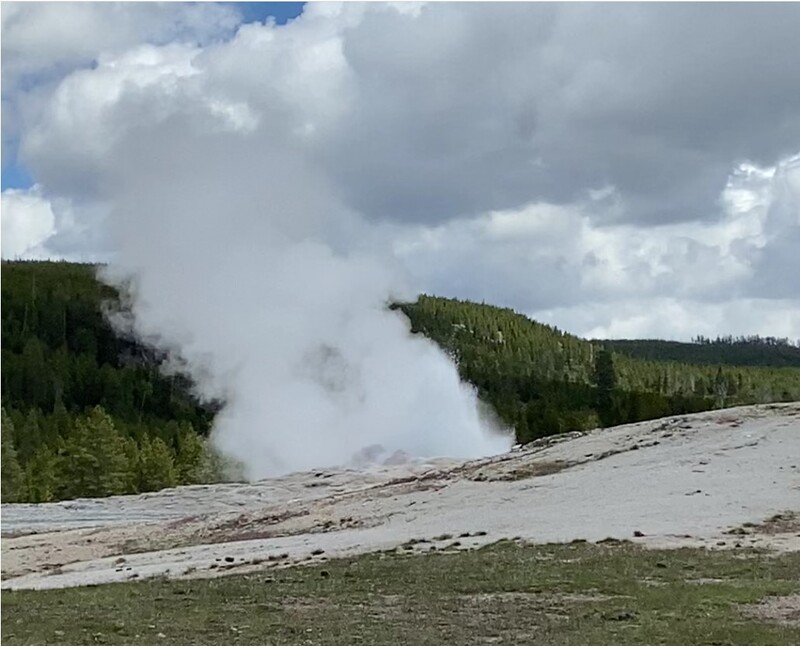 2022-06-01
2022-06-01Old Faithful Yellowstone National Park
The first trip my family and I took once COVID restrictions were lifted was to Yellowstone National Park in Wyoming. My family enjoys being outdoors and in nature and had been discussing a trip to Yellowstone for years. We rented a cabin a half hour north of the park and drove in everyday for four days. Each day, we took a different road so we could see as much of the park as possible. The most memorable part is that on the northern road, up in the mountains, there was still quite a bit of snow on the ground. About a week after we left, all that snow melted, flooded the Yellowstone River, and destroyed the road that we went in on everyday. I also enjoyed seeing the wildlife in a natural habitat, even if there were buffalo in the road a few times a day. The busiest day was the day we went to Old Faithful. Old Faithful is probably the most popular tourist attraction in the park aside from the wildlife. Everything in the area was busy; the gift shop, hotel, restaurants, boardwalks, parking lot, everything. This was the most people I saw in one place the entire trip. When we took this trip (June 2022), as far as I remember, there were no COVID restrictions in place. I would not have minded, and maybe even preferred, if there were as some places were quite compact. They did encourage social distancing in the indoor areas but nothing was enforced. It was, however, nice to experience the park in what could be perceived as normal. -
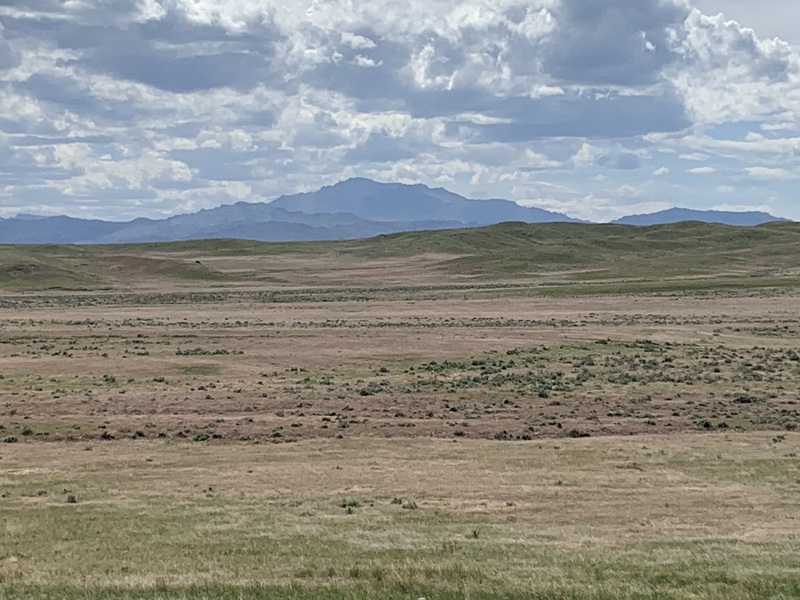 2021-06-09
2021-06-09Professor Vanlife
In the summer of 2021, I accepted an adjunct job at a college back East. Rather than spend half the salary on rent and in order to socially distance from others, I fixed up a Toyota Sienna minivan so I could live in it for the summer. This was the first trip I had taken since the late winter of 2020. On the drive out from California, I stopped to climb a mountain in Wyoming and had the trail to the summit mostly to myself. Here's what I wrote about it on Facebook: "View of Laramie Peak (elev. 10,275) in present day Wyoming, an important landmark on the Oregon Trail. For those emigrants not from Appalachia or northern New England, it was the first really big mountain they’d ever seen and it loomed in front of them for several days as they approached it from the plains. Mark Twain passed by here in 1861 and recollected later, speaking about the mountain in the third person: 'Looming vast and solitary -- a deep, dark, rich indigo blue in hue, so portentously did the old colossus frown under his beetling brows of storm-cloud. He was thirty or forty miles away, in reality, but he only seemed removed a little beyond the low ridge at our right.'" -
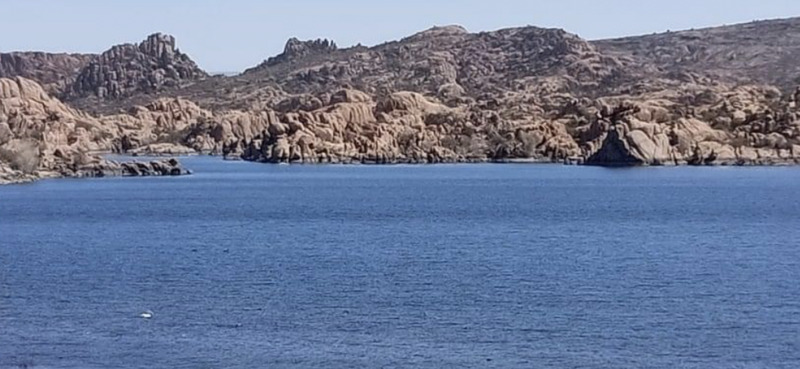 2021-03-30
2021-03-30Mojo Leaves
I took this photo of Watson Lake near the Dells five days after restrictions were lifted. From what I remember, there were no travel restrictions at the time. I was one of the few that lived on a large property, and I could stay busy feeding my animals, chopping firewood, and working on homework. However, concerning the photo, I was coming home from getting guitar strings in Prescott. It was the first time I had thought about playing music since my good friend Joseph Morganfield passed away in December 2020. He's the son of Muddy Waters and was one of my biggest supporters as an artist and musician. I always tell folks if I could have chosen a dad, it would have been Joseph. This day was important because I realized life would go on, after Covid, like it or not. -
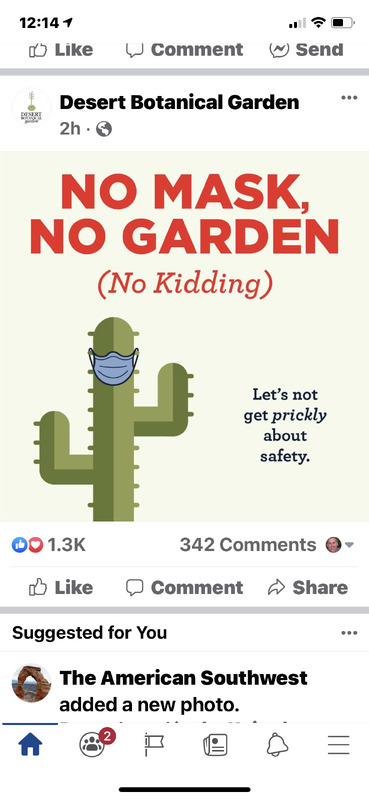 2021-03-12
2021-03-12No Mask, No Garden
The Desert Botanical Garden is a fixture of Phoenix area tourism. A botanical garden of arid lands, it's unique and draws thousands of visitors every year. Their social media emphasized the importance of masking during the pandemic, with the catchy phrase "Let's not get prickly about safety." -
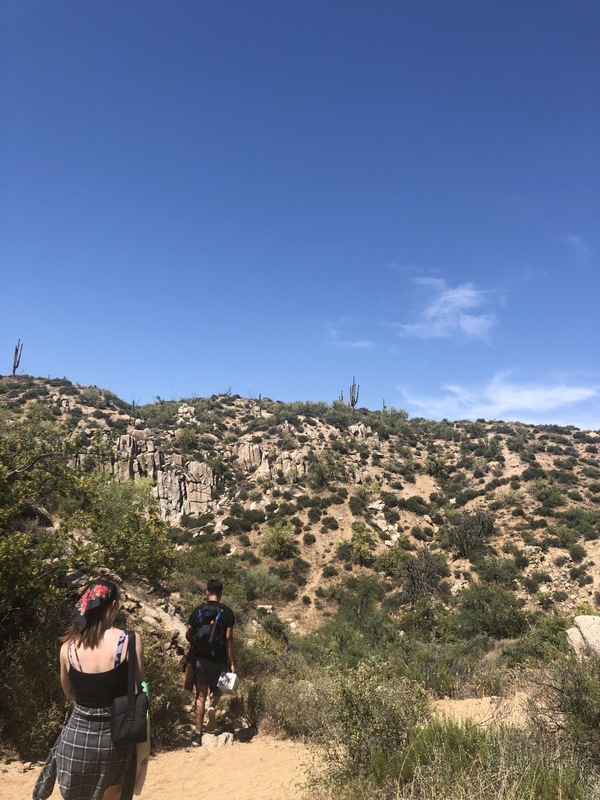 2020-05-11
2020-05-11Desert Plague
Once summer hit Arizona and all the clubs and pools remained closed due to the pandemic, my friends and I were forced to get creative. We managed to find several hiking trails outside of Phoenix that led to glorious water (a treasure out here). We would spend hours at the little pools and waterfalls, talking about what we missed from our previous lives. Sometimes we would bring packs of White Claws- a COVID hit, and pretend we were in Vegas at the dayclubs. Back then, everything was a big ‘what if.’ We all thought that by September of 2020 we would be back in classes, moving on with our lives and not giving a second thought to the mayhem the pandemic brought on. We had no idea what the future held, but we were able to escape to our desert oasis and enjoy one another the way we deserved. -
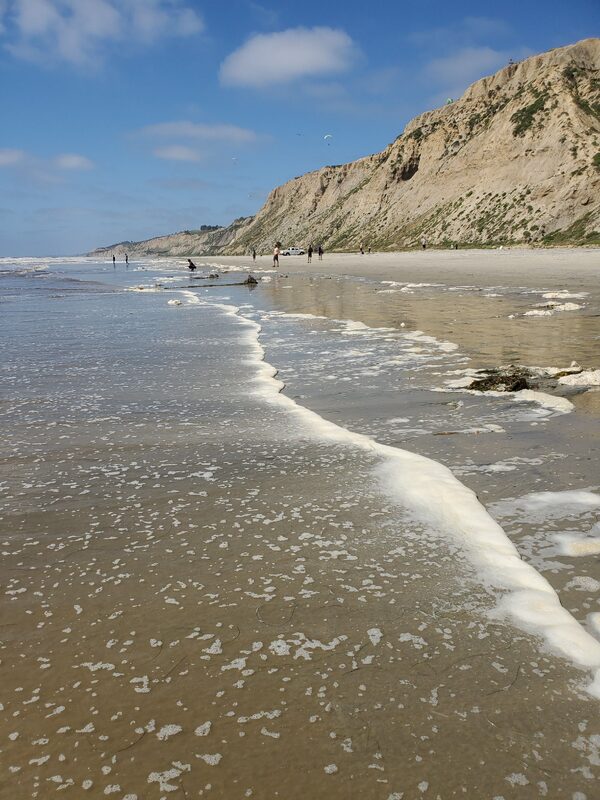 2020-05
2020-05Staying Active
San Diego has always been known for its beautiful beaches, especially during the spring and summer seasons. Normally beaches would be crowded with people laying about and basking in the sun. But this photo shows the opposite. During the lockdowns in Spring 2020, outdoor activity was encouraged for anyone who wanted to stay active. The beach was no exception. However, we could not just go to the beach to relax; we had to stay walking and moving around. There was more enforcement at the beach to make sure everyone was moving and had their masks on. Due to the lack of travel, the beach crowd was smaller than normal. Parts of the beach were even blocked off to discourage people from going too far and breaking rules. Distancing rules were enforced pretty much everywhere. -
 2021-09-16
2021-09-16Life is Better Where It's Wetter
Travel had always been in my blood. I can even remember the first time I was legally allowed to board a plane on my own without having to wear a silly "Unaccompanied Minor" badge around my neck. The idea of getting on an airplane and landing in a completely new place only hours later would always thrill me. Unfortunately, when the pandemic hit, travel started to look a little different. The freedom I once felt when I stepped foot on a 737 began to feel more like an anxiety-filled hassle. Normally, I would have been found jet-setting across the U.S. to the big cities on the east and west coasts where the parties lasted all night long, but that was no longer possible. I started to remembered how I had always wanted to visit Lake Tahoe. I'd always seen the outdoorsy girls on my Instagram feed post pictures of the clear, blue water. Maybe this was my chance to take a break from the major hubs and slow down my pace. One thing remained, though. I still didn't want to face those airports. That's when I made one of the biggest decisions of my young life. I packed up my Jeep and started out on what would become 3 weeks across our American highways - just me, a Jeep Wrangler, and the open road. I never could have expected what I would discover while driving. I truly gained a new appreciation for the world around me and realized I much preferred travel by wheel than by wing. Here I thought the freedom I felt when traveling was at risk of becoming obsolete, when in reality it was the opposite. Any time there was a unique store along the road or a picturesque landscape, I simply stopped. I never could have done that in an airplane! When I finally made it to the beach at California's gorgeous Lake Tahoe, I was speechless. It was everything I could have imagined and more. The views, the smells, the sounds - breathtaking. It was in those moments, I got my freedom back in the middle of a pandemic. -
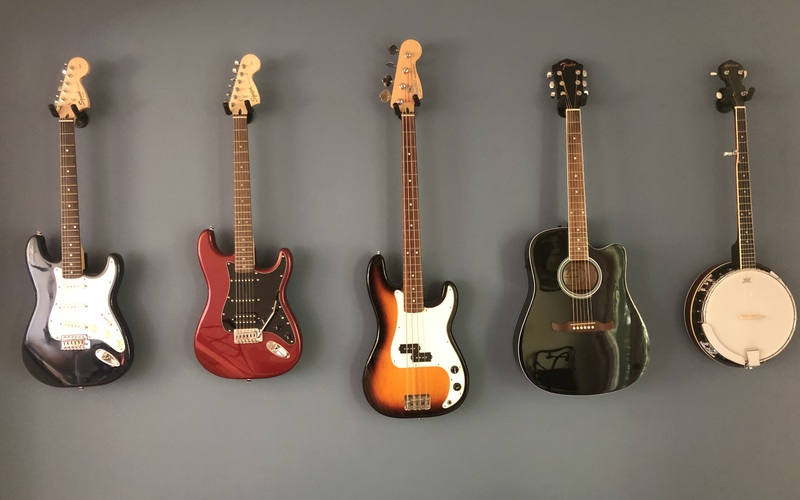 2020-04-10
2020-04-10Bring The Noise
Bringing music into the home to ease the pandemic woes. -
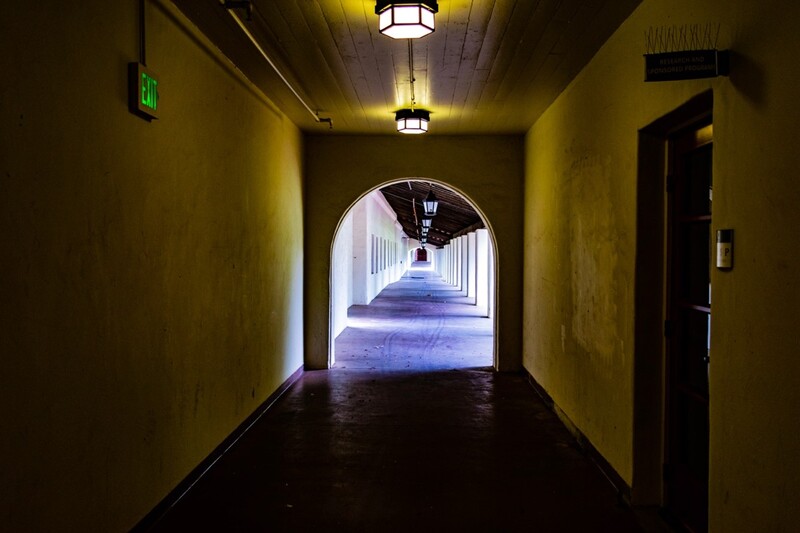 2020-06-01
2020-06-01Tranquility at Camarillo State Hospital
The property of California State University Channel Islands (CSUCI) was not always the site of the CSU’s twenty-third campus. From 1936-1997 the Spanish-colonial style buildings housed 7,000 of California’s mentally handicapped population at Camarillo State Hospital. The site sat vacant for 5 years from 1997 until CSUCI took over the old hospital buildings in 2002. The COVID-19 pandemic brought back an unnerving quietness, reminiscent of when the property was unoccupied. My mom and I took advantage of how serene the campus was and made a point to walk our dogs there several times per week. We did it not just to get out of the house, but due to how enjoyable it was to take in the beauty of the campus. Recalling these memories strongly evokes all five senses and immediately brought me back to the lockdown times of the early pandemic. The absence of college students rushing to their next class made the campus strangely quiet, but there was an enjoyable quality to it. You would occasionally hear ocean breezes whizzing around the vacant corridors and then immediately get greeted with the smell of salty beach air. It would be common for the air to be mixed with the smell of cilantro and strawberries being harvested at farms surrounding the campus. However, not all smells are made equal. When the winds would change, the on-site wastewater facility would waft heinous odors into the direction of the campus, momentarily ruining the blissful experience. The open corridors of the former hospital buildings contain steady slopes, occasionally requiring one to hold the handrails that have stood for nearly one hundred years. It always made me dive back in history and think about the thousands of patients at the hospital that probably held onto that same rail. At times we would hear screeching from the sky near the old Receiving and Treatment hospital where the current university library stands. We both would look up and see large turkey vultures or hawks elegantly gliding over the thousand-acre property, creating a picturesque scene above us. Now that we are in a post-pandemic world trying to return to normal, these experiences are not quite the same as they were in the height of the pandemic when the school was completely emptied. Students have returned to the dorms, and university-related events are once again a common occurrence throughout the campus. -
2021-01-15
The Smell of Venetian Canals
In January of 2021 my husband and I traveled to Venice Italy for a quick weekend getaway to meet up with my brother & his family. My husband and I had visited Venice before, but not since COVID, let alone during a time when regulations in Italy were quite strict; vaccine documentation had to be shown everywhere we went, masks needed to be worn at all times, etc. Upon arrival to the city, there were several things that instantly struck both my husband and I in regard to the changes we were now witnessing. A far different Venice than the one we experienced a few years before. Not only FAR less crowds, all the masked faces, empty plazas once the sun set, the clear waters of the canals, but the SMELL of Venice was different. Even though I love Venice as a city, I vividly remember the unpleasant smell of the canals when we visited a few years prior, in the height of the summer. Remebering that as we took a gondola ride through the canals, I couldn't help but notice the unpleasant aroma coming from the canal waters. But now that we have found ourselves in a COVID world Venice, the smell was noticably gone, and you could actually see the bottom of the shallow canals as you walked over the bridges throughout the city. I was previously unable to notice how truly shallow the canals were until this COVID world allowed for less polluted waters of Venice, and therefore a better smelling Venice as well. -
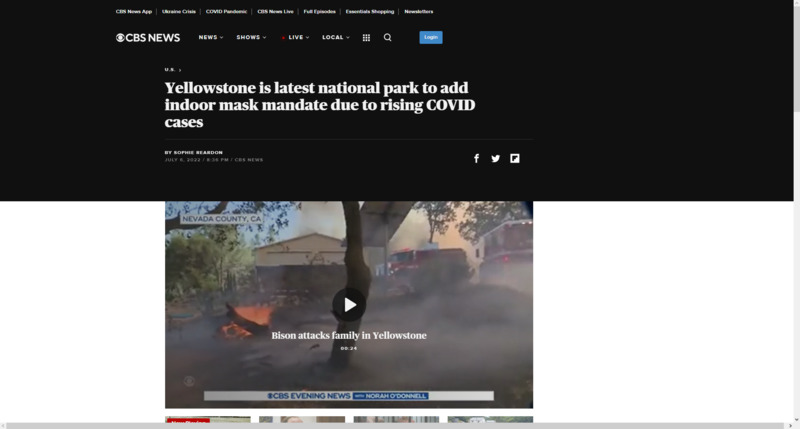 2022-07-06
2022-07-06U.S. Yellowstone is latest national park to add indoor mask mandate due to rising COVID cases
This is a news story from CBS News from Sophie Reardon. Due to rising cases, Yellowstone National Park will now require visitors two years and older to wear masks indoors. Other national parks have mask mandates too, such as the Grand Canyon, Yosemite, and the Grand Tetons. This requirement is for everyone using an indoor facility, regardless of vaccination status. For future visitors at this time to these parks, it is recommended one look up COVID requirements for the place they wish to go. -
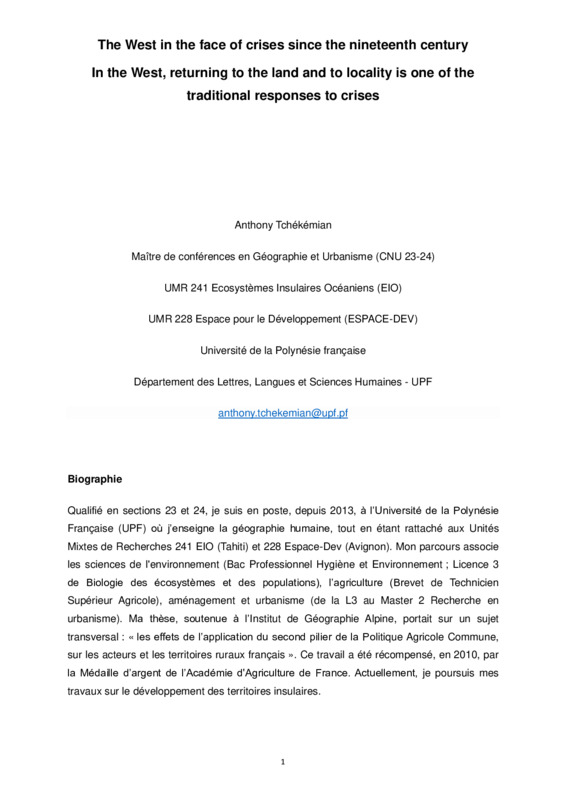 2022
2022The West in the face of crises since the nineteenth century In the West, returning to the land and to locality is one of the traditional responses to crises
Confronted with what may appear to be a series of global crises - health, environmental, economic and even democratic - the ideas on the virtues of what is local and rural are becoming increasingly heard. This article aims at putting this return to locality in historical perspective. For almost three hundred years, Western societies have gone through profound changes, especially economic ones, at the cost of a break with nature, in a more or less dramatic, and more or less painful way. Throughout our recent history, surprisingly diverse voices (political leaders, artists, activists, etc.) have conjured up this return to the land, which has taken on various forms. This return appears to be a providential solution to these disruptive changes. The health crisis due to Covid 19 seems to have not only confirmed, but also exacerbated this trend. -
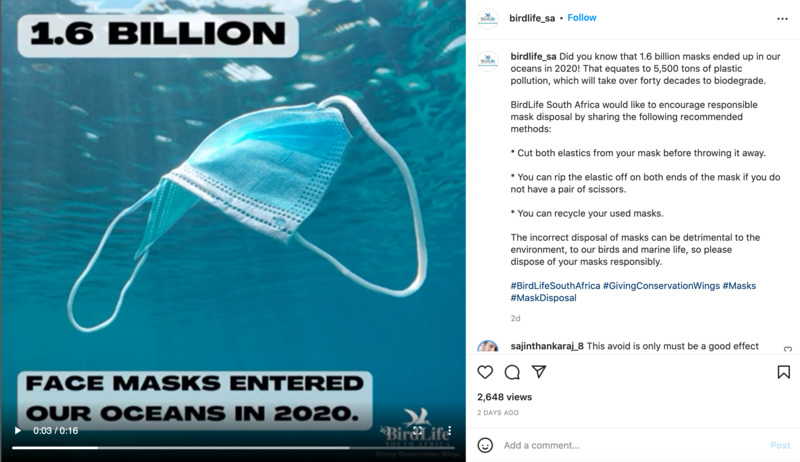 2022-06-24
2022-06-241.6 billion face masks entered our oceans in 2020
This is an Instagram post from birdlife_sa. It discusses the amount of face masks that ended up in the ocean, and what you can do to make your mask disposal more environmentally friendly. -
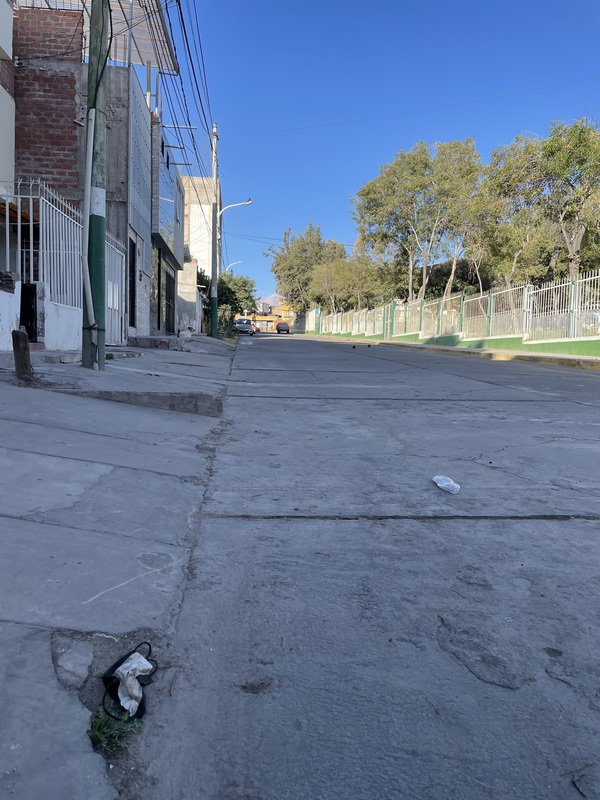 2022-05-27
2022-05-27Mask trash calle Andrés Razuri
Picture of a black disposable mask in the street near Parque 15 de Enero de la Independencia in Arequipa, Peru. -
2020-05-01
Background Noise
From 2005 to 2020, I was a police officer. My life was hectic and noisy. I carried two mandatory work cell phones everywhere I went, 24 hours a day, which rang, beeped, and chirped continuously. A police radio was on in my house, in my car, or in my ear, every hour of the day. In my world, people were always talking, at work and at home. I resigned from my position in April of 2020, just as the COVID lockdowns were coming into effect. I suddenly found myself with nowhere to be due to no longer having a job and having minimal to no contact with others due to the lockdown. Being an avid flyfisher, my days became about spending most of my time on the river alone. This was also not normal, as I am also a flyfishing guide, and am used to fishing with other people, who are usually talking to me, but due to COVID, I no longer had clients. The constant of my life went from hearing people talking (and yelling) and devises making noise, to the sound of the rushing water of the river. I soon found improvements appearing in my life. I began feeling better, sleeping better, eating better, was able to focus more, and had a much more positive attitude. All of which were side effects of being on the river everyday by myself. The COVID pandemic was an opportunity for people to re-connect with nature unknowingly, as outdoor activities were their only choice of recreation outside of their homes. Due to outdoor activity being the only option for recreation, people learned, or remembered in some cases, the value which nature can add to life, as well as how simple it is to take nature for granted. The pandemic forced people back into nature, which re-awakened (or maybe awakened for the first time) the special relationship between the human senses and nature. -
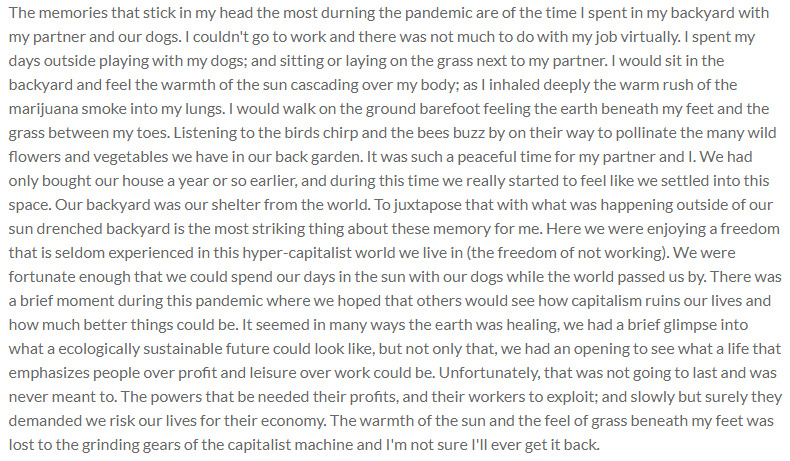 2020-04-10
2020-04-10Warmth of the sun and the feel of the grass beneath my feet.
The memories that stick in my head the most durning the pandemic are of the time I spent in my backyard with my partner and our dogs. I couldn't go to work and there was not much to do with my job virtually. I spent my days outside playing with my dogs; and sitting or laying on the grass next to my partner. I would sit in the backyard and feel the warmth of the sun cascading over my body; as I inhaled deeply the warm rush of the marijuana smoke into my lungs. I would walk on the ground barefoot feeling the earth beneath my feet and the grass between my toes. Listening to the birds chirp and the bees buzz by on their way to pollinate the many wild flowers and vegetables we have in our back garden. It was such a peaceful time for my partner and I. We had only bought our house a year or so earlier, and during this time we really started to feel like we settled into this space. Our backyard was our shelter from the world. To juxtapose that with what was happening outside of our sun drenched backyard is the most striking thing about these memory for me. Here we were enjoying a freedom that is seldom experienced in this hyper-capitalist world we live in (the freedom of not working). We were fortunate enough that we could spend our days in the sun with our dogs while the world passed us by. There was a brief moment during this pandemic where we hoped that others would see how capitalism ruins our lives and how much better things could be. It seemed in many ways the earth was healing, we had a brief glimpse into what a ecologically sustainable future could look like, but not only that, we had an opening to see what a life that emphasizes people over profit and leisure over work could be. Unfortunately, that was not going to last and was never meant to. The powers that be needed their profits, and their workers to exploit; and slowly but surely they demanded we risk our lives for their economy. The warmth of the sun and the feel of grass beneath my feet was lost to the grinding gears of the capitalist machine and I'm not sure I'll ever get it back. -
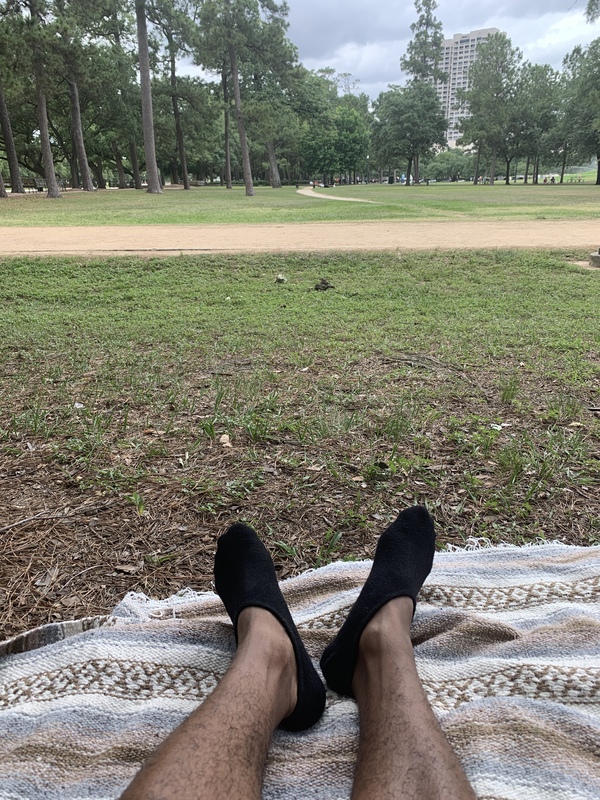 2020-05-12
2020-05-12Rediscovering Nature
When I graduated high school, I moved to a different side of Houston, TX. I was quite reserved in my new environment. This was in part because the environment was a bit rough in some parts. However, once the pandemic took place, I decided to explore my surroundings a bit more. I discovered overall, the area was quite nice. In the process of exploring my environment; I decided to check out a park that was five minutes from my house. I had been to this park as a child because of it's proximity to the city's zoo. But, I never went as an adult. The park I discovered, which is known locally as Hermann Park was one of the best discoveries I ever made in my life. This park became my escape. My place of peace. A safe space away from the hustle and bustle of everyday city life. The sensecape was pleasant. The sounds of the birds chirping blissfully while watching a squirrel crawl up a tree brought me to a place of internal calmness I had never experienced before. I enjoyed lying between the trees either in my hammock or laying out on my blanket gazing at the sunset and enjoying the peace and tranquility of the inconspicuous indistinguishable sound of people talking who were coming and going. -
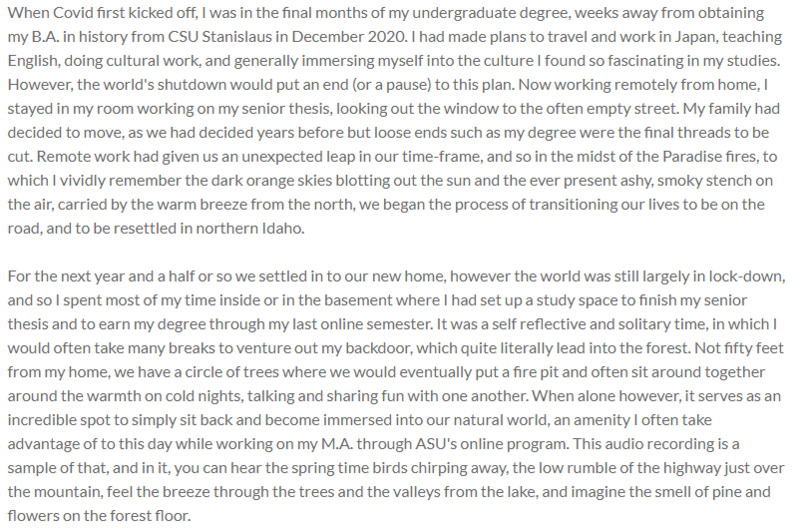 2022-05-26
2022-05-26Relocation in Isolation, Reconnection in Solitude
When Covid first kicked off, I was in the final months of my undergraduate degree, weeks away from obtaining my B.A. in history from CSU Stanislaus in December 2020. I had made plans to travel and work in Japan, teaching English, doing cultural work, and generally immersing myself into the culture I found so fascinating in my studies. However, the world's shutdown would put an end (or a pause) to this plan. Now working remotely from home, I stayed in my room working on my senior thesis, looking out the window to the often empty street. My family had decided to move, as we had decided years before but loose ends such as my degree were the final threads to be cut. Remote work had given us an unexpected leap in our time-frame, and so in the midst of the Paradise fires, to which I vividly remember the dark orange skies blotting out the sun and the ever present ashy, smoky stench on the air, carried by the warm breeze from the north, we began the process of transitioning our lives to be on the road, and to be resettled in northern Idaho. For the next year and a half or so we settled in to our new home, however the world was still largely in lock-down, and so I spent most of my time inside or in the basement where I had set up a study space to finish my senior thesis and to earn my degree through my last online semester. It was a self reflective and solitary time, in which I would often take many breaks to venture out my backdoor, which quite literally lead into the forest. Not fifty feet from my home, we have a circle of trees where we would eventually put a fire pit and often sit around together around the warmth on cold nights, talking and sharing fun with one another. When alone however, it serves as an incredible spot to simply sit back and become immersed into our natural world, an amenity I often take advantage of to this day while working on my M.A. through ASU's online program. This audio recording is a sample of that, and in it, you can hear the spring time birds chirping away, the low rumble of the highway just over the mountain, feel the breeze through the trees and the valleys from the lake, and imagine the smell of pine and flowers on the forest floor.
